Ronald E. Yates's Blog, page 110
September 16, 2014
Book Festivals: A Great Way to Meet Readers and Fellow Authors
I just returned from the Kansas Book Festival, where I was one of 30 writers from a variety of genres invited to be "presenting authors" at the day-long event.
The state of Kansas doesn't mess around when it comes to supporting the festival.
It is held in the venerable 149-year-old State Capitol building in Topeka with authors making 50-minute presentations followed by Q & A sessions throughout the day in the hallowed Senate and House Chambers as well as the courtroom of the Kansas Supreme Court.
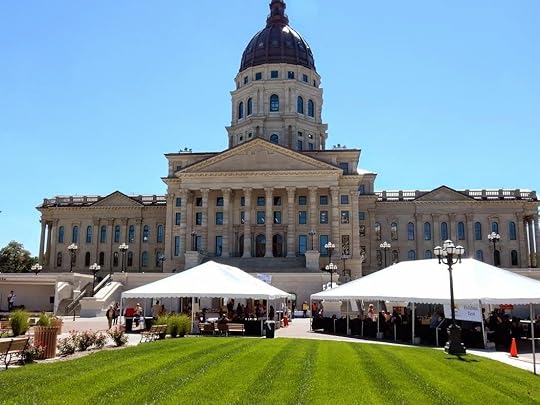 State Capitol Building: Venue of the Kansas Book Festival
State Capitol Building: Venue of the Kansas Book Festival
Spectators sit at the original 1885 handmade Kansas wild cherry wood desks in the Senate and House surrounded by ornate bronze columns plated with copper and silver; and carved white Italian marble walls inlaid with silver panels.
Not a bad venue for a bunch of scribblers to perform in.
This was the fourth year of the festival which was started by Kansas First Lady Mary Brownback in 2011.
The criteria used by the Selection Committee to choose presenting authors for the festival were these: The author was either a Kansas writer, a former Kansas author, an author who wrote a book that dealt with Kansas in some way, or a native Kansan.
However, ultimately the selection committee made its selections based on the quality of the work--which is the way it should be.
"We want to have quality books by quality authors at the Festival," Mary Brownback told me. "We think we have achieved that."
Here is a link to this year's Kansas Book Festival Presenting Authors:
https://kansasbookfestival.files.wordpress.com/2012/01/2014-kbf-program-pages-2-3-page-001.jpg
The mission of the Kansas Book Festival is to promote literacy and a life-long love of reading among people of all ages. In addition to the annual book festival, the festival also sponsors a children’s writing contest, and awards more than $10,000 annually in grants to public and school libraries across the state. More information about the festival is available at www.kansasbookfestival.com.
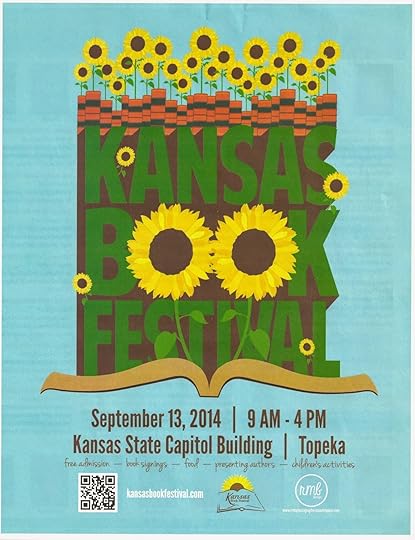
This was the second book festival I have attended in the past four months. The first was the L. A. Times Festival of Books held on the campus of the University of Southern California.
I found both festivals useful and rewarding. At the L.A. Times event I signed more than 100 of my books (Book #1 in my Finding Billy Battles Trilogy) for readers. Because it was so large with something like 50,000 people in attendance each of its two days, I didn't get an opportunity to talk with many fellow authors.
The Kansas Book Festival, which attracts about 4,000 for the one-day event provided greater opportunities to talk with other authors, but the book signings were less fruitful. Nevertheless authors should always take advantage of any opportunity to talk with readers, no matter how few show up for a book signing.
Without readers authors are nothing. Readers provide critical feedback, often ask questions we may never have thought to ask ourselves, and most of all, they provide validation for what we produce.
If you are an author and you have never attended a book festival to sign your books or to interact with the reading public and other writers, you are missing a valuable opportunity.
 Talking about my book at the Kansas Book FestivalIt is one thing to sit in the solitude of one's home or office and pound away on your computer (or typewriter for those who still do that). It is quite another to leave that sanctuary and actually meet people who read books--perhaps even some that you write.
Talking about my book at the Kansas Book FestivalIt is one thing to sit in the solitude of one's home or office and pound away on your computer (or typewriter for those who still do that). It is quite another to leave that sanctuary and actually meet people who read books--perhaps even some that you write.
Some may think participating in an online "virtual book tour" or perhaps writing a blog is all you need to do.
It is not. There is no substitute for face to face, person to person communication. And where better to do that than at an event geared to bring authors and readers together.
There are hundreds of these events throughout the United States every year. Find one near you and go. It may be the best marketing tool you will ever use.
The state of Kansas doesn't mess around when it comes to supporting the festival.
It is held in the venerable 149-year-old State Capitol building in Topeka with authors making 50-minute presentations followed by Q & A sessions throughout the day in the hallowed Senate and House Chambers as well as the courtroom of the Kansas Supreme Court.
 State Capitol Building: Venue of the Kansas Book Festival
State Capitol Building: Venue of the Kansas Book FestivalSpectators sit at the original 1885 handmade Kansas wild cherry wood desks in the Senate and House surrounded by ornate bronze columns plated with copper and silver; and carved white Italian marble walls inlaid with silver panels.
Not a bad venue for a bunch of scribblers to perform in.
This was the fourth year of the festival which was started by Kansas First Lady Mary Brownback in 2011.
The criteria used by the Selection Committee to choose presenting authors for the festival were these: The author was either a Kansas writer, a former Kansas author, an author who wrote a book that dealt with Kansas in some way, or a native Kansan.
However, ultimately the selection committee made its selections based on the quality of the work--which is the way it should be.
"We want to have quality books by quality authors at the Festival," Mary Brownback told me. "We think we have achieved that."
Here is a link to this year's Kansas Book Festival Presenting Authors:
https://kansasbookfestival.files.wordpress.com/2012/01/2014-kbf-program-pages-2-3-page-001.jpg
The mission of the Kansas Book Festival is to promote literacy and a life-long love of reading among people of all ages. In addition to the annual book festival, the festival also sponsors a children’s writing contest, and awards more than $10,000 annually in grants to public and school libraries across the state. More information about the festival is available at www.kansasbookfestival.com.

This was the second book festival I have attended in the past four months. The first was the L. A. Times Festival of Books held on the campus of the University of Southern California.
I found both festivals useful and rewarding. At the L.A. Times event I signed more than 100 of my books (Book #1 in my Finding Billy Battles Trilogy) for readers. Because it was so large with something like 50,000 people in attendance each of its two days, I didn't get an opportunity to talk with many fellow authors.
The Kansas Book Festival, which attracts about 4,000 for the one-day event provided greater opportunities to talk with other authors, but the book signings were less fruitful. Nevertheless authors should always take advantage of any opportunity to talk with readers, no matter how few show up for a book signing.
Without readers authors are nothing. Readers provide critical feedback, often ask questions we may never have thought to ask ourselves, and most of all, they provide validation for what we produce.
If you are an author and you have never attended a book festival to sign your books or to interact with the reading public and other writers, you are missing a valuable opportunity.
 Talking about my book at the Kansas Book FestivalIt is one thing to sit in the solitude of one's home or office and pound away on your computer (or typewriter for those who still do that). It is quite another to leave that sanctuary and actually meet people who read books--perhaps even some that you write.
Talking about my book at the Kansas Book FestivalIt is one thing to sit in the solitude of one's home or office and pound away on your computer (or typewriter for those who still do that). It is quite another to leave that sanctuary and actually meet people who read books--perhaps even some that you write.Some may think participating in an online "virtual book tour" or perhaps writing a blog is all you need to do.
It is not. There is no substitute for face to face, person to person communication. And where better to do that than at an event geared to bring authors and readers together.
There are hundreds of these events throughout the United States every year. Find one near you and go. It may be the best marketing tool you will ever use.
Published on September 16, 2014 17:14
September 4, 2014
Journalists at Risk: It's Part of the Job
Nobody ever said doing good journalism is easy--or safe.In fact, reporters and photographers who have spent any significant time covering war, revolution, political upheaval, and natural disaster are keenly aware that when they arrive in war ravaged places like Iraq or Afghanistan or Syria, they may not return home in one piece or even alive.That is the hard reality of the job. It is one that every correspondent and photographer must grapple with before he or she accepts a dangerous assignment.There is little doubt that James Foley and Steven Sotloff, the two freelance American journalists who were beheaded by their Islamic State of Iraq and Syria (ISIS) captors, knew the risks they were taking in going to places like Iraq and Syria.
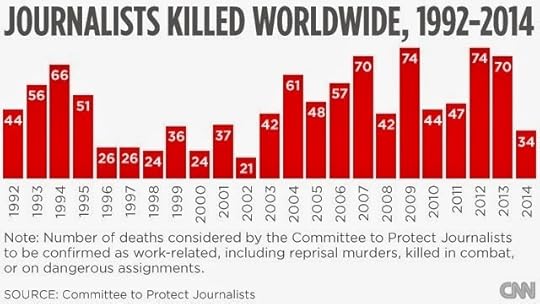 Since 1992, according to the Committee to Protect Journalists, 1,074 reporters and photographers have been killed world-wide covering the news."Why do you guys do it." a friend asked me recently, "when you obviously know how dangerous it is in those places?"Marie Colvin, the Sunday Timescorrespondent killed in Syria in 2012 may have answered that question as well as anyone:“Our mission is to speak the truth to power. We send home that first rough draft of history. We can and do make a difference in exposing the horrors of war and especially the atrocities that befall civilians.”Most correspondents and photographers I have known would answer the question in a similar way.
Since 1992, according to the Committee to Protect Journalists, 1,074 reporters and photographers have been killed world-wide covering the news."Why do you guys do it." a friend asked me recently, "when you obviously know how dangerous it is in those places?"Marie Colvin, the Sunday Timescorrespondent killed in Syria in 2012 may have answered that question as well as anyone:“Our mission is to speak the truth to power. We send home that first rough draft of history. We can and do make a difference in exposing the horrors of war and especially the atrocities that befall civilians.”Most correspondents and photographers I have known would answer the question in a similar way.
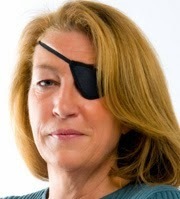 Marie Colvin Killed in 2012My answer, when asked why I used to jump on a plane and head for a war torn country, was that I was doing it to bear witness.If reporters and photographers aren't there to cover the carnage, atrocities and suffering caused by war then how will the world know what is happening? Who will speak for those ground up by the violence, displaced from their homes, murdered for their political or religious beliefs?In my case, during a 25 year career with the Chicago Tribune in Asia and Latin America, I often found myself wondering why I was putting myself in danger in order to write a story that was likely to wind up in the bottom of somebody's bird cage.Once again, Marie Colvin was right on the money back in 2010 when she said:
Marie Colvin Killed in 2012My answer, when asked why I used to jump on a plane and head for a war torn country, was that I was doing it to bear witness.If reporters and photographers aren't there to cover the carnage, atrocities and suffering caused by war then how will the world know what is happening? Who will speak for those ground up by the violence, displaced from their homes, murdered for their political or religious beliefs?In my case, during a 25 year career with the Chicago Tribune in Asia and Latin America, I often found myself wondering why I was putting myself in danger in order to write a story that was likely to wind up in the bottom of somebody's bird cage.Once again, Marie Colvin was right on the money back in 2010 when she said:
""We always have to ask ourselves whether the level of risk is worth the story. What is bravery, and what is bravado? Journalists covering combat shoulder great responsibilities and face difficult choices. Sometimes they pay the ultimate price."In the case of correspondents of my generation the countries where the ultimate price was paid were places like Vietnam, Cambodia, El Salvador, Nicaragua, Angola, and the Balkans.During the 20 or so years that I toiled abroad six of my friends were killed covering war, revolution and coups d'état. Each time that happened, I questioned why I was exposing myself to a similar fate.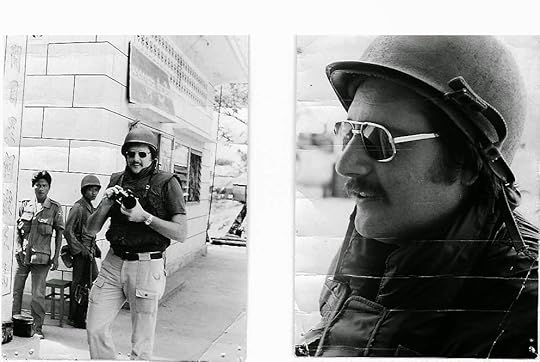 Yates Covering Cambodia & VietnamAnd each time my answer was the same: I felt a responsibility to tell the world what I was witnessing. Only then could enough pressure be brought to bear to end the carnage or help the brutalized civilian non-combatants with the basics of life: food, water, shelter and medical care.That's no doubt what motivated Foley and Sotloff to expose themselves to the dangers they faced in Syria. The barbarians who brutally took the lives of these two men are the very reasons why reporters and photographers feel compelled to cover war. These savages need to be exposed for what they are and what they represent. Look back at World War II. What if there had been courageous reporters able to write about the Nazi death camps or the horrendous atrocities committed by the Imperial Japanese Army against millions of Chinese, Filipinos and allied POWs? There is no way of knowing if stories appearing in newspapers or on radio networks of the time would have stopped what the Nazis and the Japanese were doing. It was total war, after all. But something tells me that by bearing witness some lives would have been saved.I can recall an incident in El Salvador when a government officer was about to execute an anti-government guerrilla captured after a battle near a ramshackle village. He pointed a German made G-3 rifle at the back of the kneeling guerrilla's head and seemed about ready to pull the trigger, when he noticed me standing nearby watching him.He quickly pointed his rifle to the ground and instead of shooting the guerrilla, kicked him in the back and sent him sprawling to the ground."Put him in the prisoner compound," he barked. Then he smiled at me and walked away.Did my presence save that man's life? I have no idea. But at least, for that one brief moment, a life was spared.
Yates Covering Cambodia & VietnamAnd each time my answer was the same: I felt a responsibility to tell the world what I was witnessing. Only then could enough pressure be brought to bear to end the carnage or help the brutalized civilian non-combatants with the basics of life: food, water, shelter and medical care.That's no doubt what motivated Foley and Sotloff to expose themselves to the dangers they faced in Syria. The barbarians who brutally took the lives of these two men are the very reasons why reporters and photographers feel compelled to cover war. These savages need to be exposed for what they are and what they represent. Look back at World War II. What if there had been courageous reporters able to write about the Nazi death camps or the horrendous atrocities committed by the Imperial Japanese Army against millions of Chinese, Filipinos and allied POWs? There is no way of knowing if stories appearing in newspapers or on radio networks of the time would have stopped what the Nazis and the Japanese were doing. It was total war, after all. But something tells me that by bearing witness some lives would have been saved.I can recall an incident in El Salvador when a government officer was about to execute an anti-government guerrilla captured after a battle near a ramshackle village. He pointed a German made G-3 rifle at the back of the kneeling guerrilla's head and seemed about ready to pull the trigger, when he noticed me standing nearby watching him.He quickly pointed his rifle to the ground and instead of shooting the guerrilla, kicked him in the back and sent him sprawling to the ground."Put him in the prisoner compound," he barked. Then he smiled at me and walked away.Did my presence save that man's life? I have no idea. But at least, for that one brief moment, a life was spared.
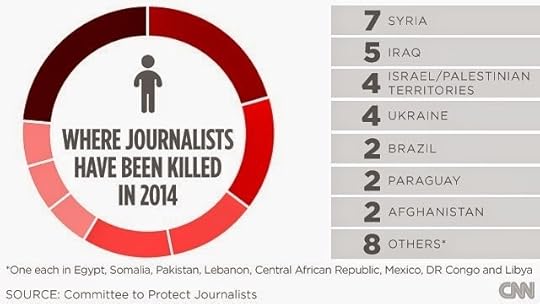 Can journalists stop wars and other forms of violence and mayhem?No, and anybody who thinks otherwise is fooling themselves. But what journalists can do is make readers, viewers and listeners aware of what is happening in places like Syria and Iraq and Afghanistan. That is our job. We are the messengers. The job of those we bring the message to is to use that information to inhibit and impede the kind of barbarism and brutality we are seeing today in Iraq and Syria.Here is my rule when it comes to dangerous assignments.When the risks associated with reporting a story are weighed against whatever benefits might be derived from the story and the risks outweigh the benefits, my rule is simple: leave and live to report another day. No story is worth your life.
Can journalists stop wars and other forms of violence and mayhem?No, and anybody who thinks otherwise is fooling themselves. But what journalists can do is make readers, viewers and listeners aware of what is happening in places like Syria and Iraq and Afghanistan. That is our job. We are the messengers. The job of those we bring the message to is to use that information to inhibit and impede the kind of barbarism and brutality we are seeing today in Iraq and Syria.Here is my rule when it comes to dangerous assignments.When the risks associated with reporting a story are weighed against whatever benefits might be derived from the story and the risks outweigh the benefits, my rule is simple: leave and live to report another day. No story is worth your life.
 Since 1992, according to the Committee to Protect Journalists, 1,074 reporters and photographers have been killed world-wide covering the news."Why do you guys do it." a friend asked me recently, "when you obviously know how dangerous it is in those places?"Marie Colvin, the Sunday Timescorrespondent killed in Syria in 2012 may have answered that question as well as anyone:“Our mission is to speak the truth to power. We send home that first rough draft of history. We can and do make a difference in exposing the horrors of war and especially the atrocities that befall civilians.”Most correspondents and photographers I have known would answer the question in a similar way.
Since 1992, according to the Committee to Protect Journalists, 1,074 reporters and photographers have been killed world-wide covering the news."Why do you guys do it." a friend asked me recently, "when you obviously know how dangerous it is in those places?"Marie Colvin, the Sunday Timescorrespondent killed in Syria in 2012 may have answered that question as well as anyone:“Our mission is to speak the truth to power. We send home that first rough draft of history. We can and do make a difference in exposing the horrors of war and especially the atrocities that befall civilians.”Most correspondents and photographers I have known would answer the question in a similar way.
 Marie Colvin Killed in 2012My answer, when asked why I used to jump on a plane and head for a war torn country, was that I was doing it to bear witness.If reporters and photographers aren't there to cover the carnage, atrocities and suffering caused by war then how will the world know what is happening? Who will speak for those ground up by the violence, displaced from their homes, murdered for their political or religious beliefs?In my case, during a 25 year career with the Chicago Tribune in Asia and Latin America, I often found myself wondering why I was putting myself in danger in order to write a story that was likely to wind up in the bottom of somebody's bird cage.Once again, Marie Colvin was right on the money back in 2010 when she said:
Marie Colvin Killed in 2012My answer, when asked why I used to jump on a plane and head for a war torn country, was that I was doing it to bear witness.If reporters and photographers aren't there to cover the carnage, atrocities and suffering caused by war then how will the world know what is happening? Who will speak for those ground up by the violence, displaced from their homes, murdered for their political or religious beliefs?In my case, during a 25 year career with the Chicago Tribune in Asia and Latin America, I often found myself wondering why I was putting myself in danger in order to write a story that was likely to wind up in the bottom of somebody's bird cage.Once again, Marie Colvin was right on the money back in 2010 when she said: ""We always have to ask ourselves whether the level of risk is worth the story. What is bravery, and what is bravado? Journalists covering combat shoulder great responsibilities and face difficult choices. Sometimes they pay the ultimate price."In the case of correspondents of my generation the countries where the ultimate price was paid were places like Vietnam, Cambodia, El Salvador, Nicaragua, Angola, and the Balkans.During the 20 or so years that I toiled abroad six of my friends were killed covering war, revolution and coups d'état. Each time that happened, I questioned why I was exposing myself to a similar fate.
 Yates Covering Cambodia & VietnamAnd each time my answer was the same: I felt a responsibility to tell the world what I was witnessing. Only then could enough pressure be brought to bear to end the carnage or help the brutalized civilian non-combatants with the basics of life: food, water, shelter and medical care.That's no doubt what motivated Foley and Sotloff to expose themselves to the dangers they faced in Syria. The barbarians who brutally took the lives of these two men are the very reasons why reporters and photographers feel compelled to cover war. These savages need to be exposed for what they are and what they represent. Look back at World War II. What if there had been courageous reporters able to write about the Nazi death camps or the horrendous atrocities committed by the Imperial Japanese Army against millions of Chinese, Filipinos and allied POWs? There is no way of knowing if stories appearing in newspapers or on radio networks of the time would have stopped what the Nazis and the Japanese were doing. It was total war, after all. But something tells me that by bearing witness some lives would have been saved.I can recall an incident in El Salvador when a government officer was about to execute an anti-government guerrilla captured after a battle near a ramshackle village. He pointed a German made G-3 rifle at the back of the kneeling guerrilla's head and seemed about ready to pull the trigger, when he noticed me standing nearby watching him.He quickly pointed his rifle to the ground and instead of shooting the guerrilla, kicked him in the back and sent him sprawling to the ground."Put him in the prisoner compound," he barked. Then he smiled at me and walked away.Did my presence save that man's life? I have no idea. But at least, for that one brief moment, a life was spared.
Yates Covering Cambodia & VietnamAnd each time my answer was the same: I felt a responsibility to tell the world what I was witnessing. Only then could enough pressure be brought to bear to end the carnage or help the brutalized civilian non-combatants with the basics of life: food, water, shelter and medical care.That's no doubt what motivated Foley and Sotloff to expose themselves to the dangers they faced in Syria. The barbarians who brutally took the lives of these two men are the very reasons why reporters and photographers feel compelled to cover war. These savages need to be exposed for what they are and what they represent. Look back at World War II. What if there had been courageous reporters able to write about the Nazi death camps or the horrendous atrocities committed by the Imperial Japanese Army against millions of Chinese, Filipinos and allied POWs? There is no way of knowing if stories appearing in newspapers or on radio networks of the time would have stopped what the Nazis and the Japanese were doing. It was total war, after all. But something tells me that by bearing witness some lives would have been saved.I can recall an incident in El Salvador when a government officer was about to execute an anti-government guerrilla captured after a battle near a ramshackle village. He pointed a German made G-3 rifle at the back of the kneeling guerrilla's head and seemed about ready to pull the trigger, when he noticed me standing nearby watching him.He quickly pointed his rifle to the ground and instead of shooting the guerrilla, kicked him in the back and sent him sprawling to the ground."Put him in the prisoner compound," he barked. Then he smiled at me and walked away.Did my presence save that man's life? I have no idea. But at least, for that one brief moment, a life was spared.
 Can journalists stop wars and other forms of violence and mayhem?No, and anybody who thinks otherwise is fooling themselves. But what journalists can do is make readers, viewers and listeners aware of what is happening in places like Syria and Iraq and Afghanistan. That is our job. We are the messengers. The job of those we bring the message to is to use that information to inhibit and impede the kind of barbarism and brutality we are seeing today in Iraq and Syria.Here is my rule when it comes to dangerous assignments.When the risks associated with reporting a story are weighed against whatever benefits might be derived from the story and the risks outweigh the benefits, my rule is simple: leave and live to report another day. No story is worth your life.
Can journalists stop wars and other forms of violence and mayhem?No, and anybody who thinks otherwise is fooling themselves. But what journalists can do is make readers, viewers and listeners aware of what is happening in places like Syria and Iraq and Afghanistan. That is our job. We are the messengers. The job of those we bring the message to is to use that information to inhibit and impede the kind of barbarism and brutality we are seeing today in Iraq and Syria.Here is my rule when it comes to dangerous assignments.When the risks associated with reporting a story are weighed against whatever benefits might be derived from the story and the risks outweigh the benefits, my rule is simple: leave and live to report another day. No story is worth your life.
Published on September 04, 2014 17:26
August 31, 2014
Predictions About the Future In Historical Novels
One of the more enduring activities of human beings has always been to imagine what the future will bring. We all do it, some more than others.
It's what separates us from the rest of earth's creatures, most of which are too consumed with daily survival to think past their last meal or their next one.
As authors of historical fiction we invent characters and put them in various bygone eras. Then we create conflict for them to deal with, people to love and to hate, obstacles to overcome, tragedy to rise above, and joyous moments to take pleasure in.
But how often do we have our characters speculate about what the world will look like in the future?
Not often, I am sure. And the reason is probably the same one I gave for earth's "other" creatures. Our characters are often dealing with one conflict after another or just trying to survive. What the world will look like one hundred, two hundred or three hundred years is simply not within their intellectual compass.
Authors who write science fiction and specifically books about time travel think about these things all the time. I do and I don't even write science fiction (though I do enjoy a good time travel story when I find one).
So what has all of this got to do with historical novels? you may be asking.
I think having characters wonder about the future either via dialogue or in unspoken reflection adds another dimension to the people we create in eras such as the Dark Ages, the Middle Ages, the Enlightenment or, in the case of my book, the 19th Century.
So how might we do that? Well, considering that truth is always stranger than fiction, you might examine predictions made about the future from some pretty famous and creative people.
Recently someone sent me a copy of a story that appeared in the 1911 edition of the now defunct Miami Metropolis newspaper.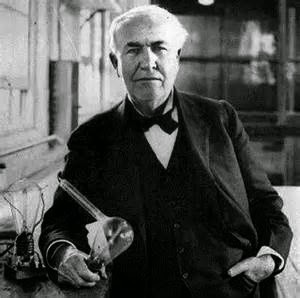 Thomas Alva Edison
Thomas Alva Edison
The story was an interview with none other than Thomas Edison in which America's most famous inventor made some rather astounding predictions about the future. Some were quite accurate and some were, shall we say, a bit off target.
For example, he rather amazingly predicts the e-book reader and at the same time predicts by 2011 we will be able to transmute metals and turn iron into gold. Ahem....
Here is that article in its entirety. Enjoy.
"What will the world be a hundred years hence?
None but a wizard dare raise the curtain and disclose the secrets of the future; and what wizard can do it with so sure a hand as Mr. Thomas Alva Edison, who has wrested so many secrets from jealous Nature? He alone of all men who live has the necessary courage and gift of foresight, and he has not shrunk from the venture.
Already, Mr. Edison tells us, the steam engine is emitting its last gasps. A century hence it will be as remote as antiquity as the lumbering coach of Tudor days, which took a week to travel from Yorkshire to London. In the year 2011 such railway trains as survive will be driven at incredible speed by electricity (which will also be the motive force of all the world's machinery), generated by "hydraulic" wheels.
But the traveler of the future, says a writer in Answers, will largely scorn such earth crawling. He will fly through the air, swifter than any swallow, at a speed of two hundred miles an hour, in colossal machines, which will enable him to breakfast in London, transact business in Paris and eat his luncheon in Cheapside.
The house of the next century will be furnished from basement to attic with steel, at a sixth of the present cost — of steel so light that it will be as easy to move a sideboard as it is today to lift a drawing room chair. The baby of the twenty-first century will be rocked in a steel cradle; his father will sit in a steel chair at a steel dining table, and his mother's boudoir will be sumptuously equipped with steel furnishings, converted by cunning varnishes to the semblance of rosewood, or mahogany, or any other wood her ladyship fancies.
Books of the coming century will all be printed leaves of nickel, so light to hold that the reader can enjoy a small library in a single volume. A book two inches thick will contain forty thousand pages, the equivalent of a hundred volumes; six inches in aggregate thickness, it would suffice for all the contents of the Encyclopedia Britannica. And each volume would weigh less than a pound.
Already Mr. Edison can produce a pound weight of these nickel leaves, more flexible than paper and ten times as durable, at a cost of five shillings. In a hundred years' time the cost will probably be reduced to a tenth.
More amazing still, this American wizard sounds the death knell of gold as a precious metal. "Gold," he says, "has even now but a few years to live. The day is near when bars of it will be as common and as cheap as bars of iron or blocks of steel.
"We are already on the verge of discovering the secret of transmuting metals, which are all substantially the same in matter, though combined in different proportions."Before long it will be an easy matter to convert a truck load of iron bars into as many bars of virgin gold.
In the magical days to come there is no reason why our great liners should not be of solid gold from stem to stern; why we should not ride in golden taxicabs, or substituted gold for steel in our drawing room suites. Only steel will be the more durable, and thus the cheaper in the long run."
Golden ocean liners and cabs? I think we can all be thankful that Edison missed the boat (and the taxi) on that one.
It's what separates us from the rest of earth's creatures, most of which are too consumed with daily survival to think past their last meal or their next one.
As authors of historical fiction we invent characters and put them in various bygone eras. Then we create conflict for them to deal with, people to love and to hate, obstacles to overcome, tragedy to rise above, and joyous moments to take pleasure in.
But how often do we have our characters speculate about what the world will look like in the future?
Not often, I am sure. And the reason is probably the same one I gave for earth's "other" creatures. Our characters are often dealing with one conflict after another or just trying to survive. What the world will look like one hundred, two hundred or three hundred years is simply not within their intellectual compass.
Authors who write science fiction and specifically books about time travel think about these things all the time. I do and I don't even write science fiction (though I do enjoy a good time travel story when I find one).
So what has all of this got to do with historical novels? you may be asking.
I think having characters wonder about the future either via dialogue or in unspoken reflection adds another dimension to the people we create in eras such as the Dark Ages, the Middle Ages, the Enlightenment or, in the case of my book, the 19th Century.
So how might we do that? Well, considering that truth is always stranger than fiction, you might examine predictions made about the future from some pretty famous and creative people.
Recently someone sent me a copy of a story that appeared in the 1911 edition of the now defunct Miami Metropolis newspaper.
 Thomas Alva Edison
Thomas Alva EdisonThe story was an interview with none other than Thomas Edison in which America's most famous inventor made some rather astounding predictions about the future. Some were quite accurate and some were, shall we say, a bit off target.
For example, he rather amazingly predicts the e-book reader and at the same time predicts by 2011 we will be able to transmute metals and turn iron into gold. Ahem....
Here is that article in its entirety. Enjoy.
"What will the world be a hundred years hence?
None but a wizard dare raise the curtain and disclose the secrets of the future; and what wizard can do it with so sure a hand as Mr. Thomas Alva Edison, who has wrested so many secrets from jealous Nature? He alone of all men who live has the necessary courage and gift of foresight, and he has not shrunk from the venture.
Already, Mr. Edison tells us, the steam engine is emitting its last gasps. A century hence it will be as remote as antiquity as the lumbering coach of Tudor days, which took a week to travel from Yorkshire to London. In the year 2011 such railway trains as survive will be driven at incredible speed by electricity (which will also be the motive force of all the world's machinery), generated by "hydraulic" wheels.
But the traveler of the future, says a writer in Answers, will largely scorn such earth crawling. He will fly through the air, swifter than any swallow, at a speed of two hundred miles an hour, in colossal machines, which will enable him to breakfast in London, transact business in Paris and eat his luncheon in Cheapside.
The house of the next century will be furnished from basement to attic with steel, at a sixth of the present cost — of steel so light that it will be as easy to move a sideboard as it is today to lift a drawing room chair. The baby of the twenty-first century will be rocked in a steel cradle; his father will sit in a steel chair at a steel dining table, and his mother's boudoir will be sumptuously equipped with steel furnishings, converted by cunning varnishes to the semblance of rosewood, or mahogany, or any other wood her ladyship fancies.
Books of the coming century will all be printed leaves of nickel, so light to hold that the reader can enjoy a small library in a single volume. A book two inches thick will contain forty thousand pages, the equivalent of a hundred volumes; six inches in aggregate thickness, it would suffice for all the contents of the Encyclopedia Britannica. And each volume would weigh less than a pound.
Already Mr. Edison can produce a pound weight of these nickel leaves, more flexible than paper and ten times as durable, at a cost of five shillings. In a hundred years' time the cost will probably be reduced to a tenth.
More amazing still, this American wizard sounds the death knell of gold as a precious metal. "Gold," he says, "has even now but a few years to live. The day is near when bars of it will be as common and as cheap as bars of iron or blocks of steel.
"We are already on the verge of discovering the secret of transmuting metals, which are all substantially the same in matter, though combined in different proportions."Before long it will be an easy matter to convert a truck load of iron bars into as many bars of virgin gold.
In the magical days to come there is no reason why our great liners should not be of solid gold from stem to stern; why we should not ride in golden taxicabs, or substituted gold for steel in our drawing room suites. Only steel will be the more durable, and thus the cheaper in the long run."
Golden ocean liners and cabs? I think we can all be thankful that Edison missed the boat (and the taxi) on that one.
Published on August 31, 2014 16:36
August 20, 2014
Elmore Leonard’s 10 Rules of Writing: Annotated
I began reading the late Elmore Leonard's books before I knew anything about writing or that I wanted to be a writer. Back then, a lot of his books were westerns filled with gritty characters, powerful stories, and tough, convincing dialogue.
I remember reading Last Stand at Sabre River and Hombre, both of which were made into successful movies. Later, after Leonard had moved from westerns to crime and suspense stories, I read Mr. Majestyk, The Big Bounce and the Moonshine War.
For the past four years I have watched with great pleasure the TV series "Justified," based on Leonard's book "Raylan" and partly written by Leonard. Season five is coming. I encourage you to take a look. It is writing at its best. And Timothy Olyphant as Raylan Givens is great.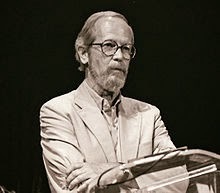 Elmore Leonard
Elmore Leonard
Elmore Leonard was a writer's writer. Not only could he spin a great story, he could create characters you loved to hate or hated to love and some you simply learned to tolerate because they made the other characters interesting.
If you like reading William Faulkner, you probably will not like reading Elmore Leonard. As brilliant as it was, Faulkner's stream-of-conscious narration probably drove Leonard nuts. He believed the writer should never get in the way of the story. (NOTE: See “Hooptedoodle″ at the end of Leonard's rules)
I am not sure when Leonard wrote his 10 Rule of Writing, but I found them a few years ago and filed them away.
Some of you may already know those 10 rules, but I am betting a lot of you don't. So let me share them with you today. Read them, consider them and most of all, try to follow them when you write your own books.
I think you will be glad you did.
Here they are:
Never open a book with weather.If it’s only to create atmosphere, and not a character’s reaction to the weather, you don’t want to go on too long. The reader is apt to leaf ahead looking for people. There are exceptions. If you happen to be Barry Lopez, who has more ways to describe ice and snow than an Eskimo, you can do all the weather reporting you want.
Avoid prologues. They can be annoying, especially a prologue following an introduction that comes after a foreword. But these are ordinarily found in nonfiction. A prologue in a novel is back story, and you can drop it in anywhere you want.
There is a prologue in John Steinbeck’s Sweet Thursday , but it’s O.K. because a character in the book makes the point of what my rules are all about. He says: “I like a lot of talk in a book and I don’t like to have nobody tell me what the guy that’s talking looks like. I want to figure out what he looks like from the way he talks. . . . figure out what the guy’s thinking from what he says. I like some description but not too much of that. . . . Sometimes I want a book to break loose with a bunch of hooptedoodle. . . . Spin up some pretty words maybe or sing a little song with language. That’s nice. But I wish it was set aside so I don’t have to read it. I don’t want hooptedoodle to get mixed up with the story.” (Note: I already violated that rule in my book Finding Billy Battles. Sorry Elmore. I won't do it again.)
Never use a verb other than “said” to carry dialogue.The line of dialogue belongs to the character; the verb is the writer sticking his nose in. But said is far less intrusive than grumbled, gasped, cautioned, lied. I once noticed Mary McCarthy ending a line of dialogue with “she asseverated,” and had to stop reading to get the dictionary. (NOTE: I learned this wonderful rule in journalism school at the University or Kansas. It has served me well.)
Never use an adverb to modify the verb “said” ……he admonished gravely. To use an adverb this way (or almost any way) is a mortal sin. The writer is now exposing himself in earnest, using a word that distracts and can interrupt the rhythm of the exchange. I have a character in one of my books tell how she used to write historical romances “full of rape and adverbs.” (NOTE: I l also learned this wonderful rule in journalism school at the University or Kansas. As with rule #3, it has served me well.)
Keep your exclamation points under control.You are allowed no more than two or three per 100,000 words of prose. If you have the knack of playing with exclaimers the way Tom Wolfe does, you can throw them in by the handful.
Never use the words “suddenly” or “all hell broke loose.”This rule doesn’t require an explanation. I have noticed that writers who use “suddenly” tend to exercise less control in the application of exclamation points.
Use regional dialect, patois, sparingly.Once you start spelling words in dialogue phonetically and loading the page with apostrophes, you won’t be able to stop. Notice the way Annie Proulx captures the flavor of Wyoming voices in her book of short stories Close Range .
Avoid detailed descriptions of characters.Which Steinbeck covered. In Ernest Hemingway’s Hills Like White Elephants what do the “American and the girl with him” look like? “She had taken off her hat and put it on the table.” That’s the only reference to a physical description in the story, and yet we see the couple and know them by their tones of voice, with not one adverb in sight.
Don’t go into great detail describing places and things.Unless you’re Margaret Atwood and can paint scenes with language or write landscapes in the style of Jim Harrison. But even if you’re good at it, you don’t want descriptions that bring the action, the flow of the story, to a standstill.
And finally:
Try to leave out the part that readers tend to skip.A rule that came to mind in 1983. Think of what you skip reading a novel: thick paragraphs of prose you can see have too many words in them. What the writer is doing, he’s writing, perpetrating hooptedoodle, perhaps taking another shot at the weather, or has gone into the character’s head, and the reader either knows what the guy’s thinking or doesn’t care. I’ll bet you don’t skip dialogue.
My most important rule is one that sums up the 10.
If it sounds like writing, I rewrite it.
Or, if proper usage gets in the way, it may have to go. I can’t allow what we learned in English composition to disrupt the sound and rhythm of the narrative. It’s my attempt to remain invisible, not distract the reader from the story with obvious writing. (Joseph Conrad said something about words getting in the way of what you want to say.)
If I write in scenes and always from the point of view of a particular character — the one whose view best brings the scene to life — I’m able to concentrate on the voices of the characters telling you who they are and how they feel about what they see and what’s going on, and I’m nowhere in sight.
What Steinbeck did in Sweet Thursday was title his chapters as an indication, though obscure, of what they cover. “Whom the Gods Love They Drive Nuts” is one, “Lousy Wednesday” another.
The third chapter is titled “Hooptedoodle 1″ and the 38th chapter “Hooptedoodle 2″ as warnings to the reader, as if Steinbeck is saying: “Here’s where you’ll see me taking flights of fancy with my writing, and it won’t get in the way of the story. Skip them if you want.”
Sweet Thursday came out in 1954, when I was just beginning to be published, and I’ve never forgotten that prologue.
Did I read the hooptedoodle chapters? Every word.
Thank you Elmore Leonard. RIP
I remember reading Last Stand at Sabre River and Hombre, both of which were made into successful movies. Later, after Leonard had moved from westerns to crime and suspense stories, I read Mr. Majestyk, The Big Bounce and the Moonshine War.
For the past four years I have watched with great pleasure the TV series "Justified," based on Leonard's book "Raylan" and partly written by Leonard. Season five is coming. I encourage you to take a look. It is writing at its best. And Timothy Olyphant as Raylan Givens is great.
 Elmore Leonard
Elmore LeonardElmore Leonard was a writer's writer. Not only could he spin a great story, he could create characters you loved to hate or hated to love and some you simply learned to tolerate because they made the other characters interesting.
If you like reading William Faulkner, you probably will not like reading Elmore Leonard. As brilliant as it was, Faulkner's stream-of-conscious narration probably drove Leonard nuts. He believed the writer should never get in the way of the story. (NOTE: See “Hooptedoodle″ at the end of Leonard's rules)
I am not sure when Leonard wrote his 10 Rule of Writing, but I found them a few years ago and filed them away.
Some of you may already know those 10 rules, but I am betting a lot of you don't. So let me share them with you today. Read them, consider them and most of all, try to follow them when you write your own books.
I think you will be glad you did.
Here they are:
Never open a book with weather.If it’s only to create atmosphere, and not a character’s reaction to the weather, you don’t want to go on too long. The reader is apt to leaf ahead looking for people. There are exceptions. If you happen to be Barry Lopez, who has more ways to describe ice and snow than an Eskimo, you can do all the weather reporting you want.
Avoid prologues. They can be annoying, especially a prologue following an introduction that comes after a foreword. But these are ordinarily found in nonfiction. A prologue in a novel is back story, and you can drop it in anywhere you want.
There is a prologue in John Steinbeck’s Sweet Thursday , but it’s O.K. because a character in the book makes the point of what my rules are all about. He says: “I like a lot of talk in a book and I don’t like to have nobody tell me what the guy that’s talking looks like. I want to figure out what he looks like from the way he talks. . . . figure out what the guy’s thinking from what he says. I like some description but not too much of that. . . . Sometimes I want a book to break loose with a bunch of hooptedoodle. . . . Spin up some pretty words maybe or sing a little song with language. That’s nice. But I wish it was set aside so I don’t have to read it. I don’t want hooptedoodle to get mixed up with the story.” (Note: I already violated that rule in my book Finding Billy Battles. Sorry Elmore. I won't do it again.)
Never use a verb other than “said” to carry dialogue.The line of dialogue belongs to the character; the verb is the writer sticking his nose in. But said is far less intrusive than grumbled, gasped, cautioned, lied. I once noticed Mary McCarthy ending a line of dialogue with “she asseverated,” and had to stop reading to get the dictionary. (NOTE: I learned this wonderful rule in journalism school at the University or Kansas. It has served me well.)
Never use an adverb to modify the verb “said” ……he admonished gravely. To use an adverb this way (or almost any way) is a mortal sin. The writer is now exposing himself in earnest, using a word that distracts and can interrupt the rhythm of the exchange. I have a character in one of my books tell how she used to write historical romances “full of rape and adverbs.” (NOTE: I l also learned this wonderful rule in journalism school at the University or Kansas. As with rule #3, it has served me well.)
Keep your exclamation points under control.You are allowed no more than two or three per 100,000 words of prose. If you have the knack of playing with exclaimers the way Tom Wolfe does, you can throw them in by the handful.
Never use the words “suddenly” or “all hell broke loose.”This rule doesn’t require an explanation. I have noticed that writers who use “suddenly” tend to exercise less control in the application of exclamation points.
Use regional dialect, patois, sparingly.Once you start spelling words in dialogue phonetically and loading the page with apostrophes, you won’t be able to stop. Notice the way Annie Proulx captures the flavor of Wyoming voices in her book of short stories Close Range .
Avoid detailed descriptions of characters.Which Steinbeck covered. In Ernest Hemingway’s Hills Like White Elephants what do the “American and the girl with him” look like? “She had taken off her hat and put it on the table.” That’s the only reference to a physical description in the story, and yet we see the couple and know them by their tones of voice, with not one adverb in sight.
Don’t go into great detail describing places and things.Unless you’re Margaret Atwood and can paint scenes with language or write landscapes in the style of Jim Harrison. But even if you’re good at it, you don’t want descriptions that bring the action, the flow of the story, to a standstill.
And finally:
Try to leave out the part that readers tend to skip.A rule that came to mind in 1983. Think of what you skip reading a novel: thick paragraphs of prose you can see have too many words in them. What the writer is doing, he’s writing, perpetrating hooptedoodle, perhaps taking another shot at the weather, or has gone into the character’s head, and the reader either knows what the guy’s thinking or doesn’t care. I’ll bet you don’t skip dialogue.
My most important rule is one that sums up the 10.
If it sounds like writing, I rewrite it.
Or, if proper usage gets in the way, it may have to go. I can’t allow what we learned in English composition to disrupt the sound and rhythm of the narrative. It’s my attempt to remain invisible, not distract the reader from the story with obvious writing. (Joseph Conrad said something about words getting in the way of what you want to say.)
If I write in scenes and always from the point of view of a particular character — the one whose view best brings the scene to life — I’m able to concentrate on the voices of the characters telling you who they are and how they feel about what they see and what’s going on, and I’m nowhere in sight.
What Steinbeck did in Sweet Thursday was title his chapters as an indication, though obscure, of what they cover. “Whom the Gods Love They Drive Nuts” is one, “Lousy Wednesday” another.
The third chapter is titled “Hooptedoodle 1″ and the 38th chapter “Hooptedoodle 2″ as warnings to the reader, as if Steinbeck is saying: “Here’s where you’ll see me taking flights of fancy with my writing, and it won’t get in the way of the story. Skip them if you want.”
Sweet Thursday came out in 1954, when I was just beginning to be published, and I’ve never forgotten that prologue.
Did I read the hooptedoodle chapters? Every word.
Thank you Elmore Leonard. RIP
Published on August 20, 2014 16:59
August 18, 2014
An Uncommon Love of Words & Writing
I have been away on vacation the past couple of weeks so I haven't been able to post anything on my blog.
However, not long ago a friend sent me a great column about a professor at my alma mater: the William Allen White School of Journalism at the University of Kansas.
His name: John Bremner, a native of Australia and ordained Catholic priest who left the priesthood to become a journalist. ("Proof that purgatory really exists," he once told me.)
While I never had the late Professor Bremner (he died in 1987) for a class, he made his presence known in the newsroom of the University Daily Kansan where I was the editor-in-chief. He often would stick his head in the door of my office and say something like: "Good paper today, Ron."
Those were the days I liked. But all too often I heard things like:
"The lead story on page one makes about as much sense as a wallaby giving a sermon," which was Prof. Bremner's way of saying it made no sense at all!
Here is the column published in July by Steve Wilson, Executive Editor, of The Paducah (KY) Sun. I hope you will enjoy it, but most of all, be prepared to learn something about words and writing.
An uncommon love of words
By Steve WilsonExecutive Editor, The Paducah SunPublished Sunday, July 6
On a local TV newscast a few days ago, the sports anchor said St. Louis Cardinals' catcher Yadier Molina had received "the lion's share of votes" and would be a starter in this summer's all-star game.
His use of "lion's share" seemed dubious and sent me back to a favorite book called Words on Words. It's written by the late John Bremner, an exuberant college professor who was obsessed with the proper use of the English language. As expected, he had an entry for "lion's share" that didn't square with the usage on TV.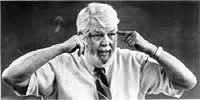 Professor John Bremner
Professor John Bremner
"If you use this cliche, know its proper meaning. In one version of the fable, Aesop's lion got all the meat except a few scraps snatched by the fox. In the other versions, the lion got it all. Properly, the lion's share means all or almost all of something, not merely a majority."
Bremner was a charismatic figure - 6-foot-5, 260-pounds, white bearded, a native Australian who spent the biggest part of his career teaching journalism at the University of Kansas. He also put on seminars for newspaper editors around the country, which is how we met and became friends.
He was an animated instructor, pacing the room, digressing to tell a story about British history one moment, then raging about the confusion caused by a misplaced comma the next. More than once he had thrown open a window in his classroom, waved his white handkerchief and shouted, "Help, I'm being held captive by a roomful of idiots."
Such theatrics, he said, were less about ego than connecting with the audience.
"You don't hold students and professionals by simply filling them with facts and snippets of knowledge. You have to keep them interested, keep them alert."
He enjoyed pointing out the illogic of many word usages.
"You want the word couple to be singular?" he asked. "All right, the couple was married yesterday. It went to Florida on its honeymoon. OK so far. But it had an argument. So it decided to get a divorce. And it went its separate ways."
His book is a pleasure to peruse:
Advance planning - Have you planned backward lately?
At the present time - Now.
At this point in time - Now.
Better part of - "She stayed for the better part of an hour" means she stayed for more than a half-hour. Why better? Are the first 30 minutes better than the last 30? Make it "most of the hour."
Chair - Keep it a noun. What's wrong with "Smith presided at the meeting" or "Smith was the chairman"? Pretty soon we'll be saying Smith "podiumed the orchestra" or "pulpited the church." Some fingers need to be kept in the verbal dikes.
Facilitate - A windy word for "make easier, aid, assist, help."
Goes without saying - So why say it?
Irregardless - Regardless of the school of "a word is a word if people utilize it," there is no such word as irregardless.
Precipitate/Precipitous - Though both adjectives derive from the same root (Latin praeceps, headlong), precipitate means excessively hasty and refers to actions, whereas precipitous means extremely steep and refers to physical objects. The bishop who counseled against "precipitous marriage" either was ignorant of the distinction or was jumping to the conclusion that rash decisions lead to rocky adventure.
Split infinitive - Splitting an infinitive means inserting one or more words between the to and the verb, as in "to thoroughly appreciate." Banning the split infinitive is ridiculous. The so-called rule has no foundation in logic, rhetoric or common sense. Go ahead and split. Let euphony be your guide. Never to split is to seriously stifle.
Toward/Towards - Most authorities consider toward American and towards British. But a case can be made for towards in American usage when the following word begins with a vowel sound. There is sibilant smoothness in "towards evening."
Ugly scar - Don't say, "He has an ugly scar on his face." Drop ugly. Ugliness is in the eye of the beholder. Don't force the reader to subscribe to your sensitivities.
For all his wit and wisdom about editing, one of the most memorable moments of our seminar came at the end when Bremner said he wanted to share a poem by John Ciardi.
He first explained that a widgeon is a duck, a wicopy is a tree and widgeons do not roost in trees. When the editors gave him quizzical looks, he smiled and proceeded to recite the lines from memory:
A widgeon in a wicopyIn which no widgeon ought to be,A widowed widgeon was.While in a willow wickiupA Wichita sat down to supWith other Wichitas,And what they whittled as they ateIncluded what had been of lateA widgeon's wing.'Twas thusThe widgeon in the wicopy,In which no widgeon ought to be,A widowed widgeon was.
When he finished, he told the group in a soft-spoken voice, "If you don't like that, get out of this business."
Bremner devoted his life to the best use of words. A tender, alliterative arrangement could make his day.
However, not long ago a friend sent me a great column about a professor at my alma mater: the William Allen White School of Journalism at the University of Kansas.
His name: John Bremner, a native of Australia and ordained Catholic priest who left the priesthood to become a journalist. ("Proof that purgatory really exists," he once told me.)
While I never had the late Professor Bremner (he died in 1987) for a class, he made his presence known in the newsroom of the University Daily Kansan where I was the editor-in-chief. He often would stick his head in the door of my office and say something like: "Good paper today, Ron."
Those were the days I liked. But all too often I heard things like:
"The lead story on page one makes about as much sense as a wallaby giving a sermon," which was Prof. Bremner's way of saying it made no sense at all!
Here is the column published in July by Steve Wilson, Executive Editor, of The Paducah (KY) Sun. I hope you will enjoy it, but most of all, be prepared to learn something about words and writing.
An uncommon love of words
By Steve WilsonExecutive Editor, The Paducah SunPublished Sunday, July 6
On a local TV newscast a few days ago, the sports anchor said St. Louis Cardinals' catcher Yadier Molina had received "the lion's share of votes" and would be a starter in this summer's all-star game.
His use of "lion's share" seemed dubious and sent me back to a favorite book called Words on Words. It's written by the late John Bremner, an exuberant college professor who was obsessed with the proper use of the English language. As expected, he had an entry for "lion's share" that didn't square with the usage on TV.
 Professor John Bremner
Professor John Bremner"If you use this cliche, know its proper meaning. In one version of the fable, Aesop's lion got all the meat except a few scraps snatched by the fox. In the other versions, the lion got it all. Properly, the lion's share means all or almost all of something, not merely a majority."
Bremner was a charismatic figure - 6-foot-5, 260-pounds, white bearded, a native Australian who spent the biggest part of his career teaching journalism at the University of Kansas. He also put on seminars for newspaper editors around the country, which is how we met and became friends.
He was an animated instructor, pacing the room, digressing to tell a story about British history one moment, then raging about the confusion caused by a misplaced comma the next. More than once he had thrown open a window in his classroom, waved his white handkerchief and shouted, "Help, I'm being held captive by a roomful of idiots."
Such theatrics, he said, were less about ego than connecting with the audience.
"You don't hold students and professionals by simply filling them with facts and snippets of knowledge. You have to keep them interested, keep them alert."
He enjoyed pointing out the illogic of many word usages.
"You want the word couple to be singular?" he asked. "All right, the couple was married yesterday. It went to Florida on its honeymoon. OK so far. But it had an argument. So it decided to get a divorce. And it went its separate ways."
His book is a pleasure to peruse:
Advance planning - Have you planned backward lately?
At the present time - Now.
At this point in time - Now.
Better part of - "She stayed for the better part of an hour" means she stayed for more than a half-hour. Why better? Are the first 30 minutes better than the last 30? Make it "most of the hour."
Chair - Keep it a noun. What's wrong with "Smith presided at the meeting" or "Smith was the chairman"? Pretty soon we'll be saying Smith "podiumed the orchestra" or "pulpited the church." Some fingers need to be kept in the verbal dikes.
Facilitate - A windy word for "make easier, aid, assist, help."
Goes without saying - So why say it?
Irregardless - Regardless of the school of "a word is a word if people utilize it," there is no such word as irregardless.
Precipitate/Precipitous - Though both adjectives derive from the same root (Latin praeceps, headlong), precipitate means excessively hasty and refers to actions, whereas precipitous means extremely steep and refers to physical objects. The bishop who counseled against "precipitous marriage" either was ignorant of the distinction or was jumping to the conclusion that rash decisions lead to rocky adventure.
Split infinitive - Splitting an infinitive means inserting one or more words between the to and the verb, as in "to thoroughly appreciate." Banning the split infinitive is ridiculous. The so-called rule has no foundation in logic, rhetoric or common sense. Go ahead and split. Let euphony be your guide. Never to split is to seriously stifle.
Toward/Towards - Most authorities consider toward American and towards British. But a case can be made for towards in American usage when the following word begins with a vowel sound. There is sibilant smoothness in "towards evening."
Ugly scar - Don't say, "He has an ugly scar on his face." Drop ugly. Ugliness is in the eye of the beholder. Don't force the reader to subscribe to your sensitivities.
For all his wit and wisdom about editing, one of the most memorable moments of our seminar came at the end when Bremner said he wanted to share a poem by John Ciardi.
He first explained that a widgeon is a duck, a wicopy is a tree and widgeons do not roost in trees. When the editors gave him quizzical looks, he smiled and proceeded to recite the lines from memory:
A widgeon in a wicopyIn which no widgeon ought to be,A widowed widgeon was.While in a willow wickiupA Wichita sat down to supWith other Wichitas,And what they whittled as they ateIncluded what had been of lateA widgeon's wing.'Twas thusThe widgeon in the wicopy,In which no widgeon ought to be,A widowed widgeon was.
When he finished, he told the group in a soft-spoken voice, "If you don't like that, get out of this business."
Bremner devoted his life to the best use of words. A tender, alliterative arrangement could make his day.
Published on August 18, 2014 15:30
August 5, 2014
Journalistic Method: Test Your Powers of Observation
When I was teaching journalism at the University of Illinois, I often gave my students a test designed to see just how observant they were.
Observation, as I have pointed out in previous posts, is a critical skill writers need to master IF they are to provide clear and vivid descriptions in their stories or novels.
There are 25 questions in the quiz. The average number of questions students were able to answer correctly was 8.
Many of you reading my blog are writers, so I am confident you can beat that score, right? Let's see how you do. Write down your answers as you go. Check your answers at the end AFTER completing all the questions.
REMEMBER -- NO CHEATING!!! BE HONEST!!! That means no looking at your i-phone, your computer, your i-pad or any reference books on your desk.
LET'S JUST SEE HOW OBSERVANT YOU RE ALLY ARE.
Here we go!
1. On a standard traffic light, is the green on the top or bottom?
2. How many states are there in the USA? (Don't laugh, some people don't know)
3. In which hand is the Statue of Liberty's torch?
4. What six colors are on the classic Campbell's soup label?
5. What two numbers on the telephone dial don't have letters by them?
6. When you walk does your left arm swing with your right or left leg? (Don't you dare get up to see!)
7. How many matches are in a standard pack?
8. On the United State s flag is the top stripe red or white?
9. What is the lowest number on a U.S. FM radio Dial?
10. Which way does water go down the drain, counter or clockwise?
11. Which way does a "no smoking" sign's slash run?
12. Coca-Cola. Read the text in the small poster below. Do you notice something strange?
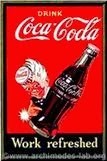
13 On which side of a women's blouse are the buttons?
14. Which way do fans rotate?
15 How many sides does a stop sign have?
16. Do books have even-numbered pages on the right or left side?
17 How many lug nuts are on a standard car wheel?
18. How many sides are there on a standard pencil?
19. Sleepy, Happy, Sneezy, Grumpy, Dopey, Doc. Who's missing?
20. How many hot dog buns are in a standard package?
21 On which playing card is the card maker's trademark?
22 On which side of a Venetian blind is the cord that adjusts the opening between the slats?
23. There are 12 buttons on a touch tone phone. What 2 symbols bear no digits?
24. How many curves are there in the standard paper clip?
25. Does a merry-go-round turn counter or clockwise?
26. (BONUS QUESTION) Carefully read the article below and detect any incongruity!

SCROLL DOWN FOR THE ANSWERS
ANSWERS
1. On a standard traffic light, is the green on the top or bottom? BOTTOM
2. How many states are there in the USA ? (Don't laugh, some people don't know) 50
3. In which hand is the Statue of Liberty's torch? RIGHT
4. What six colors are on the classic Campbell 's soup label? BLUE, RED, WHITE, YELLOW, BLACK & GOLD.
5. What two numbers on the telephone dial don't have letters by them? 1, 0
6. When you walk does your left arm swing with your right or left leg? RIGHT
7. How many matches are in a standard pack? 20
8. On the United State s flag is the top stripe red or white? RED
9. What is the lowest number on the FM dial? 88
10. Which way does water go down the drain, counter or clockwise? CLOCKWISE (NORTH OF THE EQUATOR)
11. Which way does a "no smoking" sign's slash run?
TOWARDS BOTTOM RIGHT
12. Are you a fan of Coca–Cola? Then it is time to check out this new brand of Coca-Coda
13 On which side of a women's blouse are the buttons? LEFT
14. Which way do fans! rotate? CLOCKWISE AS YOU LOOK AT IT
15 How many sides does a stop sign have? 8
16. Do books have even-numbered pages on the right or left side? LEFT
17 How many lug nuts are on a standard car wheel? 5
18. How many sides are there on a standard pencil? 6
19. Sleepy, Happy, Sneezy, Grumpy, Dopey, Doc. Who's missing? BASHFUL
20. How many hot dog buns are in a standard package? 8
21 On which playing card is the card maker's trademark? ACE OF SPADES
22 On which side of a Venetian blind is the cord that adjusts the opening between the slats? LEFT
23. There are 12 buttons on a touch tone phone. What 2 symbols bear no digits? * , #
24. How many curves are there in the! standard d paper clip? 3
25. Does a merry-go-round turn counter or clockwise? COUNTER
26. If the Mulan disappeared and there were no survivors to tell what happened, how could the journalist who wrote this report what the captain and crew did the night before?
Now send it to some of your friends or colleagues and put your score in the subject box!!!
Published on August 05, 2014 17:07
August 2, 2014
Journalistic Method: A Technique for Authors (Part 2)
How can the methods of reporting and writing practiced by professional journalists possibly benefit those who write fiction? After all, the rules of journalism demand that you shape your writing to your material, not the other way around.
The answer can be found in the fundamentals of the writer's craft: Observation and Research. In journalism research is called reporting but learning how to "see" what is going on around you is the same for both the novelist and the journalist.
It's called observation.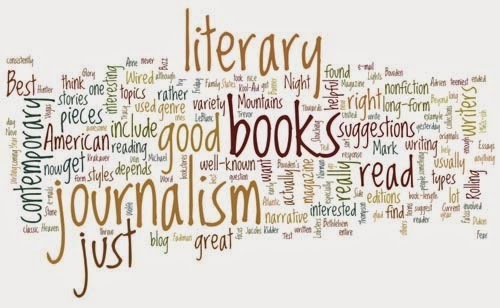
For the journalist precise observation is one of the keys to accurate reporting. For the writer of fiction seeing the world accurately not only allows you to create vivid descriptions that readers can believe, it can spur the imagination.
For the journalist, the most serious obstacles to accurate observation lie in the mental baggage we all carry—the preconception, the stereotype, the prejudice.
It's the same for the novelist. The preconceived belief, the stereotype and the prejudgment distort our vision, leading us to see only what we expected to find, instead of what may really be in front of us. No human being can exorcise them, but all writers must learn to identify their mental baggage and check it at the door.
Unlike the journalist, however, authors of fiction can allow their biases to be expressed through the characters they create. The journalist must boil down an anecdote to its essentials, even if some participants or some quotes must be left out. It is dishonest to distort a scene or change quotes to make the anecdote funnier or more pertinent.
In fiction, that is not a problem. However, experienced writers will carefully observe and mentally record a scene so they can incorporate it their narrative. They may alter the scene or the quote or the anecdote to fit the story they are telling, but if they have been keen observers the scene they are altering will have a strong basis in reality and it will ring true with readers.
Most writers and journalists begin their research and reporting with at least some idea of what they will find—or what they think they should find. There is nothing inherently wrong with that. In scientific research, the same sort of presumption is called a hypothesis.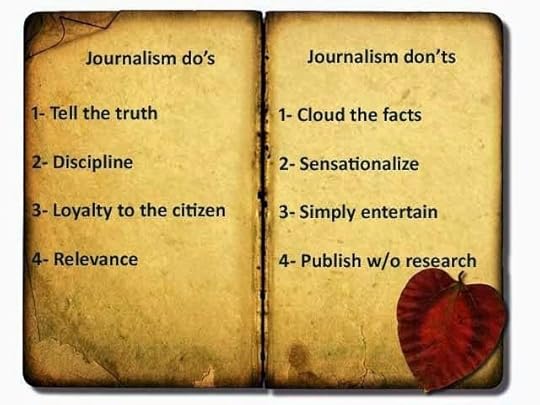
It is accepted as the essential starting point for any research project. The scientific method demands that the scientist, in testing the hypothesis, look for evidence to disprove it. That high standard of detachment is not always met, even in science.
But it is the standard that every writer should apply to his or her work.
Its fine to begin with an idea of your likely conclusion, so long as you keep your eyes and your mind open to evidence that may suggest a different conclusion. Careful observation will turn up the evidence; an open mind will accept it.
Scientists have another tool that more reporters and writers would do well to borrow. In science, it’s called reviewing the literature.
What do I mean by that? No reputable researcher launches a study without carefully combing the journals of the discipline to learn everything possible about the research already done, the questions left unanswered, the methods others have found useful.
An hour spent on The Internet, a computer data base, or down at the public library often will net you reams of invaluable information. In reviewing the literature, writers, like scientists, often can improve their ideas about what questions to ask and where to look for the answers.
The best novelists write from experience--predominantly their own. They do this, not by relying only on their memories, but by recording events, incidents, encounters, people, etc. in notebooks.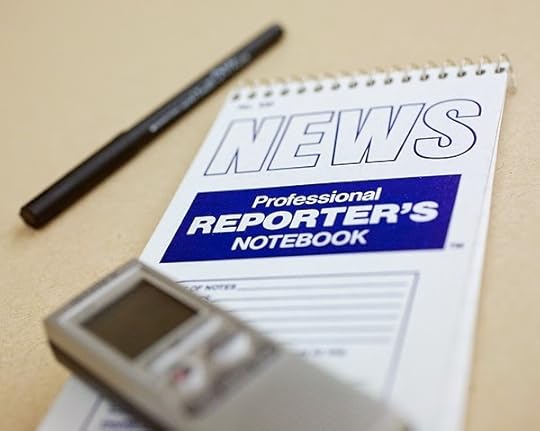
I have dozens of old reporter's notebooks that are filled with descriptions of people, places, and events I covered during a 27 year-career as a reporter and foreign correspondent for the Chicago Tribune.
When it comes to recreating scenes or experiences, those notebooks are worth their weight in platinum. And the descriptions are not just visual. They also include the other four senses: sound and smell; and in some cases, taste and touch.
Those notebooks are a critical form of observation. Without them my view of the past would be shadowy and indistinct, but most of all the descriptions I create in my novels would lack that critical precision and veracity readers need in order to "see" what you are writing.
The answer can be found in the fundamentals of the writer's craft: Observation and Research. In journalism research is called reporting but learning how to "see" what is going on around you is the same for both the novelist and the journalist.
It's called observation.

For the journalist precise observation is one of the keys to accurate reporting. For the writer of fiction seeing the world accurately not only allows you to create vivid descriptions that readers can believe, it can spur the imagination.
For the journalist, the most serious obstacles to accurate observation lie in the mental baggage we all carry—the preconception, the stereotype, the prejudice.
It's the same for the novelist. The preconceived belief, the stereotype and the prejudgment distort our vision, leading us to see only what we expected to find, instead of what may really be in front of us. No human being can exorcise them, but all writers must learn to identify their mental baggage and check it at the door.
Unlike the journalist, however, authors of fiction can allow their biases to be expressed through the characters they create. The journalist must boil down an anecdote to its essentials, even if some participants or some quotes must be left out. It is dishonest to distort a scene or change quotes to make the anecdote funnier or more pertinent.
In fiction, that is not a problem. However, experienced writers will carefully observe and mentally record a scene so they can incorporate it their narrative. They may alter the scene or the quote or the anecdote to fit the story they are telling, but if they have been keen observers the scene they are altering will have a strong basis in reality and it will ring true with readers.
Most writers and journalists begin their research and reporting with at least some idea of what they will find—or what they think they should find. There is nothing inherently wrong with that. In scientific research, the same sort of presumption is called a hypothesis.

It is accepted as the essential starting point for any research project. The scientific method demands that the scientist, in testing the hypothesis, look for evidence to disprove it. That high standard of detachment is not always met, even in science.
But it is the standard that every writer should apply to his or her work.
Its fine to begin with an idea of your likely conclusion, so long as you keep your eyes and your mind open to evidence that may suggest a different conclusion. Careful observation will turn up the evidence; an open mind will accept it.
Scientists have another tool that more reporters and writers would do well to borrow. In science, it’s called reviewing the literature.
What do I mean by that? No reputable researcher launches a study without carefully combing the journals of the discipline to learn everything possible about the research already done, the questions left unanswered, the methods others have found useful.
An hour spent on The Internet, a computer data base, or down at the public library often will net you reams of invaluable information. In reviewing the literature, writers, like scientists, often can improve their ideas about what questions to ask and where to look for the answers.
The best novelists write from experience--predominantly their own. They do this, not by relying only on their memories, but by recording events, incidents, encounters, people, etc. in notebooks.

I have dozens of old reporter's notebooks that are filled with descriptions of people, places, and events I covered during a 27 year-career as a reporter and foreign correspondent for the Chicago Tribune.
When it comes to recreating scenes or experiences, those notebooks are worth their weight in platinum. And the descriptions are not just visual. They also include the other four senses: sound and smell; and in some cases, taste and touch.
Those notebooks are a critical form of observation. Without them my view of the past would be shadowy and indistinct, but most of all the descriptions I create in my novels would lack that critical precision and veracity readers need in order to "see" what you are writing.
Published on August 02, 2014 16:51
July 29, 2014
Journalistic Method: A Technique for Authors (Part 1)
Without doubt, one of the best places to learn the craft of writing is in the professional newsroom.
The number of successful authors of fiction and non-fiction books, who began their careers as journalists, is remarkable. Here is a list of 10 (It could be 50 or 100):
· Charles Dickens· Samuel Clements (Mark Twain)· Ken Follett· Thomas Thompson· Ernest Hemingway· Edna Buchanan· George Orwell· Graham Greene· PG Wodehouse· Tom Wolfe
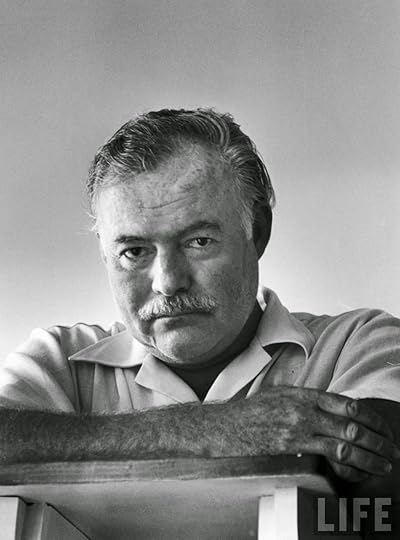 Ernest HemingwaySomeone once asked Ernest Hemingway where he learned to write. His answer: working as a general assignment reporter for the Kansas City Star from 1917 to 1918.
Ernest HemingwaySomeone once asked Ernest Hemingway where he learned to write. His answer: working as a general assignment reporter for the Kansas City Star from 1917 to 1918.
"Everything I needed to know about writing I learned from the Kansas City Star style sheet," Hemingway once said.
The first paragraph of that style sheet reflects Hemingway's writing style. It begins: "Use short sentences. Use short first paragraphs. Use vigorous English. Be positive, not negative."
The advice may seem simplistic, but it is far from it. One of the first things I learned as a young journalist (coincidentally, at the Kansas City Star) was how to write succinctly and clearly and how to gather information accurately.
Hemingway did all of those things--and he did them well, both as a journalist and later as a Nobel Prize winning novelist.
Not far behind those skills is something called Journalistic Method. That is a fancy phrase for how a journalist works.
That is what I want to talk about today. In parts 2 and 3 of my blog on Journalistic Method I will get into some of the other skill sets such as the aforementioned ability to write succinctly and clearly, how to gather information accurately, and how to organize it and present it in a compelling way. Those who write novels can learn a lot from the skills required to produce excellent journalism.
Journalism is an empirical discipline. What do I mean by that?
It means, like science, it is a search for truth. It means you use trial and error, observation and analysis to find the truth.
The Dictionary defines empiricism it this way: Relying on or derived from observation or experiment: empirical results that supported the hypothesis. b. Verifiable or provable by means of observation or experiment: empirical laws. Guided by practical experience and not theory.
It’s also how journalists go about finding stories.
For the scientist, empiricism means arriving at a truth via observation and experimentation. For the journalist the empirical tools are: Observation and Interviewing.
The best writers, whether they are journalists, novelists or authors of non-fiction books, are the best observers.
Observation is the basis of everything.
Take this story from Asia about a Buddhist sage walking with two students through the forest. He stops suddenly and looks up at a tree.
"What do you observe in the tree?" He asks the first student. The first student’s eyes lock on the tree. Suddenly his face lights up.
“I see a bird in the tree, master” he says, sure his powers of observation in finding the small bird in the tree's thick green foliage will please his religious teacher.
“What do you see?”the aged priest asks the other student.
The second student pauses, his eyes fixed on the tree for several moments.
Finally, the second student speaks: “I see a bird with red, yellow and black feathers sitting on a dead limb. A green tree snake is crawling on a limb just behind the bird.”
That is observation. Observation is an active, not a passive process.
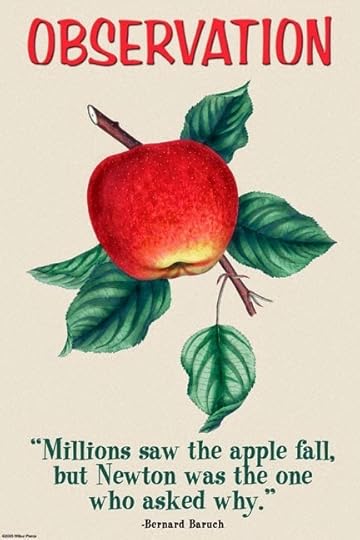
Legend has it that the ancient Druids forced candidates for the priesthood to study an oak tree and capture its every feature. Then the candidate would be questioned about the tree. If the candidate failed to describe the tree accurately, he would be nailed to it.
Druidic discipline is not practiced in newsrooms, but the precision of observation it was intended to encourage should be. Not every good reporter is a good writer, but every good writer is a good reporter. Reporting IS observation.
Of the qualities that distinguish good from bad writing, three depend directly on observation. They are clarity, precision, and appeal to the senses. The others—pacing and transition—lend grace and power to the expression of what you have observed.
Clarity, precision and appeal to the senses seldom are achieved just by looking or listening. You usually have to seek out information that is not readily apparent.
The reporter’s main research tool is interviewing. All reporters interview; but few interview as well as they might. Fewer still get beyond the interview to other sources of information and understanding.
Documents, the records of business, government and personal life, can be invaluable in answering questions and providing detail. Even the methods of social science offer help for the writer who would be a better observer.
A keen observer understands the importance of detail and texture, as well as the use of precise language. That means a dearth of adjectives and heavy on action verbs—fueled by detailed observation.
My advice: To write well, first see well.
Good observation depends on two things: concentration and analysis. As a writer you must be an observer by occupation. That means you’re always on the job. Everything you see, hear, smell, taste and touch is potentially material you can use in a story.
Flies take off backwards. So in order to swat one, you must strike slightly behind it. That’s a detail a writer should be able to pick up on. Other people see flies; a writer sees how they move.
No two people, no two situations, no two oak trees are identical. Your job is to sort out the important differences. You must get in the habit of concentrating on what is going on around you. It is hard work. How do you do it? Look for the significant detail. Look for the revealing anecdote. Look with your mind, as well as your eyes, open. Prepare before you start to look.
Henry James once said: “Be one on whom nothing is lost.”

Listen to people talk. Listen to what they say and how they say it. Most of us don’t listen. Most of us are busy thinking about what WE want to say while someone else is talking. As a result, we misunderstand, misinterpret and worse, misquote.
Note things that others take for granted. For example, the excessive neatness of a bureaucrat’s desk may reveal not efficiency, but the fact that he or she has nothing to do! A pretentious private library may contain books with uncut pages!
So what’s the difference between a novelist and a reporter? Besides the fact that one writes fiction and the other doesn't (or shouldn't), their goals are similar: to create compelling stories that people will want to read, learn from or be entertained by.
You must describe! You cannot rely on imagination to give you the crusty feel of crisp frozen ground underfoot or the razor-drag of chill air across your face. You must see these things; know them, before you can communicate them.
Writers are verbal creatures. But they must observe vividly. Good writers write after the fact, not from inspiration. They write what they have seen—and what they have seen well!
The number of successful authors of fiction and non-fiction books, who began their careers as journalists, is remarkable. Here is a list of 10 (It could be 50 or 100):
· Charles Dickens· Samuel Clements (Mark Twain)· Ken Follett· Thomas Thompson· Ernest Hemingway· Edna Buchanan· George Orwell· Graham Greene· PG Wodehouse· Tom Wolfe
 Ernest HemingwaySomeone once asked Ernest Hemingway where he learned to write. His answer: working as a general assignment reporter for the Kansas City Star from 1917 to 1918.
Ernest HemingwaySomeone once asked Ernest Hemingway where he learned to write. His answer: working as a general assignment reporter for the Kansas City Star from 1917 to 1918."Everything I needed to know about writing I learned from the Kansas City Star style sheet," Hemingway once said.
The first paragraph of that style sheet reflects Hemingway's writing style. It begins: "Use short sentences. Use short first paragraphs. Use vigorous English. Be positive, not negative."
The advice may seem simplistic, but it is far from it. One of the first things I learned as a young journalist (coincidentally, at the Kansas City Star) was how to write succinctly and clearly and how to gather information accurately.
Hemingway did all of those things--and he did them well, both as a journalist and later as a Nobel Prize winning novelist.
Not far behind those skills is something called Journalistic Method. That is a fancy phrase for how a journalist works.
That is what I want to talk about today. In parts 2 and 3 of my blog on Journalistic Method I will get into some of the other skill sets such as the aforementioned ability to write succinctly and clearly, how to gather information accurately, and how to organize it and present it in a compelling way. Those who write novels can learn a lot from the skills required to produce excellent journalism.
Journalism is an empirical discipline. What do I mean by that?
It means, like science, it is a search for truth. It means you use trial and error, observation and analysis to find the truth.
The Dictionary defines empiricism it this way: Relying on or derived from observation or experiment: empirical results that supported the hypothesis. b. Verifiable or provable by means of observation or experiment: empirical laws. Guided by practical experience and not theory.
It’s also how journalists go about finding stories.
For the scientist, empiricism means arriving at a truth via observation and experimentation. For the journalist the empirical tools are: Observation and Interviewing.
The best writers, whether they are journalists, novelists or authors of non-fiction books, are the best observers.
Observation is the basis of everything.
Take this story from Asia about a Buddhist sage walking with two students through the forest. He stops suddenly and looks up at a tree.
"What do you observe in the tree?" He asks the first student. The first student’s eyes lock on the tree. Suddenly his face lights up.
“I see a bird in the tree, master” he says, sure his powers of observation in finding the small bird in the tree's thick green foliage will please his religious teacher.
“What do you see?”the aged priest asks the other student.
The second student pauses, his eyes fixed on the tree for several moments.
Finally, the second student speaks: “I see a bird with red, yellow and black feathers sitting on a dead limb. A green tree snake is crawling on a limb just behind the bird.”
That is observation. Observation is an active, not a passive process.

Legend has it that the ancient Druids forced candidates for the priesthood to study an oak tree and capture its every feature. Then the candidate would be questioned about the tree. If the candidate failed to describe the tree accurately, he would be nailed to it.
Druidic discipline is not practiced in newsrooms, but the precision of observation it was intended to encourage should be. Not every good reporter is a good writer, but every good writer is a good reporter. Reporting IS observation.
Of the qualities that distinguish good from bad writing, three depend directly on observation. They are clarity, precision, and appeal to the senses. The others—pacing and transition—lend grace and power to the expression of what you have observed.
Clarity, precision and appeal to the senses seldom are achieved just by looking or listening. You usually have to seek out information that is not readily apparent.
The reporter’s main research tool is interviewing. All reporters interview; but few interview as well as they might. Fewer still get beyond the interview to other sources of information and understanding.
Documents, the records of business, government and personal life, can be invaluable in answering questions and providing detail. Even the methods of social science offer help for the writer who would be a better observer.
A keen observer understands the importance of detail and texture, as well as the use of precise language. That means a dearth of adjectives and heavy on action verbs—fueled by detailed observation.
My advice: To write well, first see well.
Good observation depends on two things: concentration and analysis. As a writer you must be an observer by occupation. That means you’re always on the job. Everything you see, hear, smell, taste and touch is potentially material you can use in a story.
Flies take off backwards. So in order to swat one, you must strike slightly behind it. That’s a detail a writer should be able to pick up on. Other people see flies; a writer sees how they move.
No two people, no two situations, no two oak trees are identical. Your job is to sort out the important differences. You must get in the habit of concentrating on what is going on around you. It is hard work. How do you do it? Look for the significant detail. Look for the revealing anecdote. Look with your mind, as well as your eyes, open. Prepare before you start to look.
Henry James once said: “Be one on whom nothing is lost.”

Listen to people talk. Listen to what they say and how they say it. Most of us don’t listen. Most of us are busy thinking about what WE want to say while someone else is talking. As a result, we misunderstand, misinterpret and worse, misquote.
Note things that others take for granted. For example, the excessive neatness of a bureaucrat’s desk may reveal not efficiency, but the fact that he or she has nothing to do! A pretentious private library may contain books with uncut pages!
So what’s the difference between a novelist and a reporter? Besides the fact that one writes fiction and the other doesn't (or shouldn't), their goals are similar: to create compelling stories that people will want to read, learn from or be entertained by.
You must describe! You cannot rely on imagination to give you the crusty feel of crisp frozen ground underfoot or the razor-drag of chill air across your face. You must see these things; know them, before you can communicate them.
Writers are verbal creatures. But they must observe vividly. Good writers write after the fact, not from inspiration. They write what they have seen—and what they have seen well!
Published on July 29, 2014 17:32
July 24, 2014
So You Want to Travel Back in Time?
When I taught a class in foreign correspondence at the University of Illinois I was always saddened at how little knowledge of history my students had.
I didn't blame my students so much as I blamed their K-12 schools for sending them into the world with little if any appreciation for the past and how it shaped today's world.
I was amazed at how many students simply assumed that the world they lived in today was always this way. Most thought the modern conveniences we take for granted today were always there--just made from different materials or designed differently.
When I revealed to students how different life was in 1905 (less than 110 years ago) most were stunned.
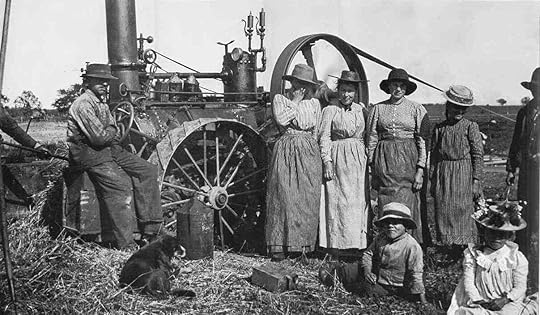 Lunchtime on a Kansas Farm 1905
Lunchtime on a Kansas Farm 1905I pointed out that in 1905 average life expectancy in the U.S. was 47 years; that only 14 percent of the homes in the U.S. had a bathtub; that only 8 percent of the homes had a telephone; that 95 percent of all births took place at home; that 20 percent of adults couldn't read or write; that only 6 percent of all Americans graduated from high school; that marijuana, heroin, and morphine were all available over the counter at the local corner drugstores; and that there were only 230 reported murders in the entire U.S. you could hear a pin drop.
Those facts alone spurred some students to learn more about life in the past.
For me, an author of historical novels, visiting the past is not an option. It is a requirement. How can you write a novel set in the 19th or 18th Centuries without understanding what life was like for the characters you create? The answer: you can't.
One semester, as I was teaching my class, I came across some fascinating facts about life in England during the 16th Century. I am sure it mirrored life in 1500's France, Germany, Italy and other European countries.
I don't know who the author is, or when it was written, or even how accurate it is, but when I shared it with my students eyes widened and jaws dropped. Here it is, and to the person who wrote this, my everlasting thanks.
THE 1500's IN ENGLAND
The next time you are washing your hands and complain because the water temperature isn't just how you like it, think about how things used to be...
Here are some facts about the 1500's, otherwise known as the middle ages:
Most people got married in June because they took their yearly bath in May and still smelled pretty good by June. However, they were starting to smell, so brides carried a bouquet of flowers to hide the body odor. Baths consisted of a big tub filled with hot water.
The man of the house had the privilege of the nice clean water, then all the sons and men, then the women and finally the children -- last of all the babies. By then the water was so dirty you could actually lose someone in it--hence the saying, "Don't throw the baby out with the bath water."
Houses had thatched roofs -- thick straw, piled high, with no wood underneath. It was the only place for animals to get warm, so all the dogs, cats and other small animals (mice rats, and bugs) lived in the roof. When it rained it became slippery and sometimes the animals would slip and fall off the roof--hence the saying, "It's raining cats and dogs."
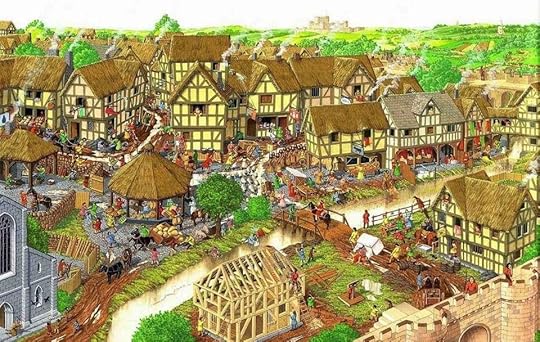 English Town 1500's
English Town 1500's
There was nothing to stop things from falling into the house. This posed a real problem in the bedroom where bugs and other droppings could really mess up your nice clean bed. Hence, a bed with big posts and sheet hung over the top afforded some protection. That's how canopy beds came into existence.
The floor was dirt. Only the wealthy had something other than dirt, hence the saying, "dirt poor." The wealthy had slate floors that would get slippery in the winter when wet, so they spread thresh on the floor to help keep their footing. As the winter wore on, they kept adding more thresh until when you opened the door it would all start slipping outside. A piece of wood was placed in the entryway--hence, a "thresh-hold."
People cooked in the kitchen with a big kettle that always hung over the fire. Every day they lit the fire and added things to the pot. They ate mostly vegetables and did not get much meat. They would eat the stew for dinner, leaving leftovers in the pot to get cold overnight and then start over the next day. Sometimes the stew had food in it that had been there for quite a while--hence the rhyme, "peas porridge hot, peas porridge cold, peas porridge in the pot nine days old."
Sometimes they could obtain pork, which made them feel quite special. When visitors came over, they would hang up their bacon to show off. It was a sign of wealth that a man "could bring home the bacon." They would cut off a little to share with guests and would all sit around and "chew the fat."
Those with money had plates made of pewter. Food with a high acid content caused some of the lead to leach onto the food, causing lead poisoning and death. This happened most often with tomatoes, so for the next 400 years or so, tomatoes were considered poisonous.
Most people did not have pewter plates, but had trenchers, a piece of Wood with the middle scooped out like a bowl. Often trenchers were made from stale paysan bread, which was so old and hard that they could use them for quite some time. Trenchers were never washed and a lot of times worms and mold got into the wood and old bread. After eating off wormy moldy trenchers, one would get "trench mouth."
Bread was divided according to status. Workers got the burnt bottom of the loaf, the family got the middle, and guests got the top, or "upper crust."
Lead cups were used to drink ale or whiskey. The combination would sometimes knock them out for a couple of days. Someone walking along the road would take them for dead and prepare them for burial. They were laid out on the kitchen table for a couple of days and the family would gather around and eat and drink and wait and see if they would wake up-hence the custom of holding a "wake."
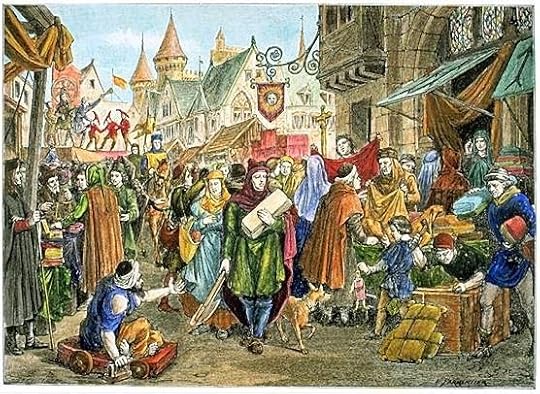 Market Day English Town 1500's
Market Day English Town 1500's
England is old and small and they started running out of places to bury people. So they would dig up coffins and would take the bones to a "bone-house" and reuse the grave. When reopening these coffins, one out of every 25 coffins were found to have scratch marks on the inside and they realized they had been burying people alive.
Somebody came up with the idea of tying a string around the wrist of the corpse. They then ran the string through the coffin up through the ground and tied it to a bell. Someone would have to sit out in the graveyard all night (the "graveyard shift") to listen for the bell. Thus, someone freshly buried could be "saved by the bell."
As I mentioned earlier, I have no idea how accurate any of this is, but it seems to make sense to me. (Though I always thought "saved by the bell" was a boxing term in which a fighter who had been knocked to the canvas was not counted "out" if the bell ending the round sounded first).
But what do I know. I still believe in King Arthur, Sir Lancelot, Queen Guinevere and the quest for the Holy Grail--not to mention fire breathing dragons.
A confession: I only believe in fire breathing dragons after too much Kaw River Coffin Varnish, otherwise known as grandpappy's corn squeezin.
Published on July 24, 2014 16:20
July 18, 2014
WRITING THE MEMOIR (Part 2)
In my last post I talked broadly about what a memoir is and what it isn't. Now I want to focus on the fundamentals of writing that you need to master in order to produce a compelling memoir.Some people think writing is nothing more than stringing together a collection of words that sound good in a sentence. That's like a novice painter slapping a lot of different colors on a canvas because they look good together.
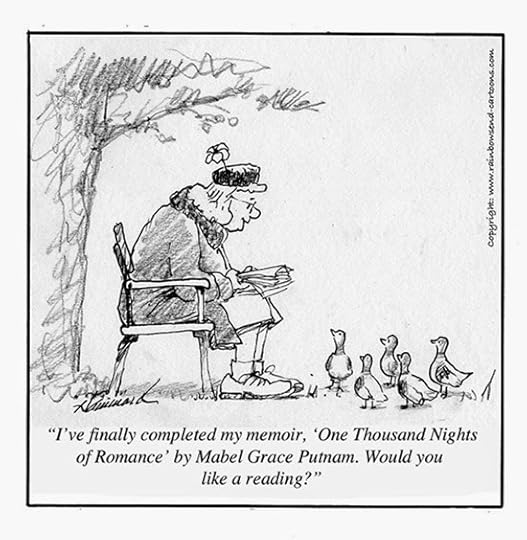 In both cases the creation lacks focus and doesn't tell a story.The writer and the artist both need to understand and use the fundamentals of their disciplines in order to create something that stirs our emotions and satisfies us in some personal way.People who write memoirs without understanding the most basic tenets of the writer's craft are like the untrained and nascent artist who wants to paint like Monet or Degas without basic conceptual knowledge of composition, accent, and perspective; or how to properly employ the color wheel, the palette, and brushes.There are really only a couple of ways to learn those fundamentals. (1) Take some classes where your work receives evaluation and assessment from a credible, experienced professional; or (2) spend several months reading books and articles on writing and then practice, practice, practice by writing, writing, writing.As Ernest Hemingway once said: “It's none of their business that you have to learn how to write. Let them think you were born that way.” The first thing you will learn when you sit down in front of your computer (or before that blank sheet of paper, if you decide to compose in long hand) is that writing is an intensely solitary activity. My advice is to seek support from other writers as you work on your memoir. Few people can appreciate the struggles a writer faces like another writer can.I already mentioned that you should consider taking a writing course at a university, community college, or community center. Classes like these provide structure and often require you to produce a set number of pages on deadline. This kind of rigid structure is very helpful for some writers. It teaches writing discipline. The critical thing is this: the grades you receive (if grades are given) are less important than the skills you must master and the feedback you will receive. You might also join a book club. Seek out a club that specializes in memoirs and biographies, etc. Listen to what other readers admire in the books you are reading as well as what they don’t like. This information can prove invaluable to you when writing your own memoir.Join an online writers group. They are easy to find and most cost nothing to join. Some are more serious than others, but in most cases members are eager to share information about such things as the writing process, research, submitting a manuscript for publication, sending work to literary agents, etc. Make a point of attending book festivals and local readings at libraries and book stores. You should join in the world of books and writing at the grassroots level. Talk to other authors and listen to their experiences, not only in writing but in marketing their books. You will develop new friendships, learn new lessons, and come to see and appreciate books in a new light. Now, let's look a few fundamentals of memoir writing.
In both cases the creation lacks focus and doesn't tell a story.The writer and the artist both need to understand and use the fundamentals of their disciplines in order to create something that stirs our emotions and satisfies us in some personal way.People who write memoirs without understanding the most basic tenets of the writer's craft are like the untrained and nascent artist who wants to paint like Monet or Degas without basic conceptual knowledge of composition, accent, and perspective; or how to properly employ the color wheel, the palette, and brushes.There are really only a couple of ways to learn those fundamentals. (1) Take some classes where your work receives evaluation and assessment from a credible, experienced professional; or (2) spend several months reading books and articles on writing and then practice, practice, practice by writing, writing, writing.As Ernest Hemingway once said: “It's none of their business that you have to learn how to write. Let them think you were born that way.” The first thing you will learn when you sit down in front of your computer (or before that blank sheet of paper, if you decide to compose in long hand) is that writing is an intensely solitary activity. My advice is to seek support from other writers as you work on your memoir. Few people can appreciate the struggles a writer faces like another writer can.I already mentioned that you should consider taking a writing course at a university, community college, or community center. Classes like these provide structure and often require you to produce a set number of pages on deadline. This kind of rigid structure is very helpful for some writers. It teaches writing discipline. The critical thing is this: the grades you receive (if grades are given) are less important than the skills you must master and the feedback you will receive. You might also join a book club. Seek out a club that specializes in memoirs and biographies, etc. Listen to what other readers admire in the books you are reading as well as what they don’t like. This information can prove invaluable to you when writing your own memoir.Join an online writers group. They are easy to find and most cost nothing to join. Some are more serious than others, but in most cases members are eager to share information about such things as the writing process, research, submitting a manuscript for publication, sending work to literary agents, etc. Make a point of attending book festivals and local readings at libraries and book stores. You should join in the world of books and writing at the grassroots level. Talk to other authors and listen to their experiences, not only in writing but in marketing their books. You will develop new friendships, learn new lessons, and come to see and appreciate books in a new light. Now, let's look a few fundamentals of memoir writing.
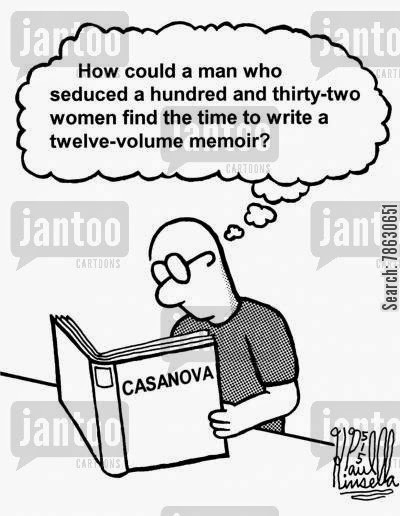 Perhaps the first thing you need to ask yourself is: Why are you writing a memoir? Is it to leave a legacy for your family or for others? Is it to share what you have learned in your life; your wisdom? How will others feel after reading your memoir? Will they be happy or touched? Will what you write make a difference in their lives? And how will you feel after you finish your memoir? Will you be fulfilled, pleased or will you feel there are still some things left unsaid?Don't be too hard on yourself. But at the same time, be truthful. Writing a memoir is as much about telling the truth about your life, as it is recording important events. You are not going to remember some things you wish you could and you will remember some things you wish you could forget. That's life! It is filled with success and anguish. It is those experiences--both good and bad-- that make a good memoir.Memory is volatile. You may remember peculiar details, such as the smell of one of your grandmother's favorite dishes, but forget your grandmother's first name. Not to worry. The answers may come in dreams, chance conversations, photos or letters. There will be times when you won't know what to write. Don't let that stop you. Write down anything that is in your head. You may feel what you are writing sounds stupid. That's OK, write it down anyway. It doesn't matter. The key is to keep writing...typing the words in your computer or keeping the pen moving over the paper. Eventually, the words will begin start to flow. Isaac Asimov may have said it best: "Writing, to me, is simply thinking through my fingers."Think about writing a little each day. Don't worry if the task seems daunting or that you don't seem to be producing very much. Think about it. It took you years to live your life and deal with the experiences you have had. You can't write it all down in a few short days or weeks. Take it one day at a time. In a few weeks or months you will have produced dozens of pages.
Perhaps the first thing you need to ask yourself is: Why are you writing a memoir? Is it to leave a legacy for your family or for others? Is it to share what you have learned in your life; your wisdom? How will others feel after reading your memoir? Will they be happy or touched? Will what you write make a difference in their lives? And how will you feel after you finish your memoir? Will you be fulfilled, pleased or will you feel there are still some things left unsaid?Don't be too hard on yourself. But at the same time, be truthful. Writing a memoir is as much about telling the truth about your life, as it is recording important events. You are not going to remember some things you wish you could and you will remember some things you wish you could forget. That's life! It is filled with success and anguish. It is those experiences--both good and bad-- that make a good memoir.Memory is volatile. You may remember peculiar details, such as the smell of one of your grandmother's favorite dishes, but forget your grandmother's first name. Not to worry. The answers may come in dreams, chance conversations, photos or letters. There will be times when you won't know what to write. Don't let that stop you. Write down anything that is in your head. You may feel what you are writing sounds stupid. That's OK, write it down anyway. It doesn't matter. The key is to keep writing...typing the words in your computer or keeping the pen moving over the paper. Eventually, the words will begin start to flow. Isaac Asimov may have said it best: "Writing, to me, is simply thinking through my fingers."Think about writing a little each day. Don't worry if the task seems daunting or that you don't seem to be producing very much. Think about it. It took you years to live your life and deal with the experiences you have had. You can't write it all down in a few short days or weeks. Take it one day at a time. In a few weeks or months you will have produced dozens of pages.
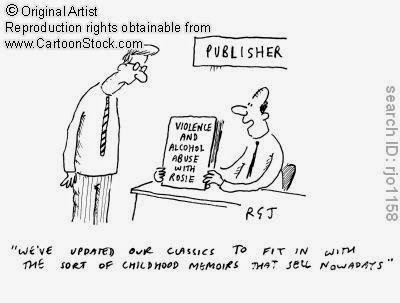
In writing a memoir remember that emotional truth is often more important than factual truth. What do I mean by that? What years did Uncle Bill serve in the Army? What was the unforgettable neighbor's name who lived across the street? These are all significant details that you will want to know when writing your memoir. But don't worry if you can't recall them.More important is how proud you were when your Uncle Bill was awarded the Congressional Medal of Honor or how relieved you were when your car wouldn't start and that neighbor drove you and your pregnant wife to the hospital during a raging snow storm and got you there five minutes before your daughter was born. Facts fill in the story's canvas. But it's the emotive truths that hold the story's heart.Don’t tell your story sequentially. That’s too obvious. Most good books don’t start at the beginning. Instead they captivate you with instant conflict and intrigue. A good beginning provides readers with just enough deception to hook them without revealing the ending. Then it returns to the chronological beginning and fills in the backdrop.When you're writing make sure you use all five of your senses. You want your readers to inhabit vivid new worlds that you have created for them. However, too many novice writers produce first drafts that are lackluster, mind-numbing and uninspiring.Write colorfully, intensely and with texture if you want to transport readers to the world you are creating. How do you do that? By creating detail; by using all of your senses (sight, smell, touch, sound, and taste) to fully re-create a moment in time. It's easy to learn how to do this. The next time you’re waiting in a line at a restaurant, the post office or the dentist's office, become aware of the diverse sights, sounds, smells, and textures around you.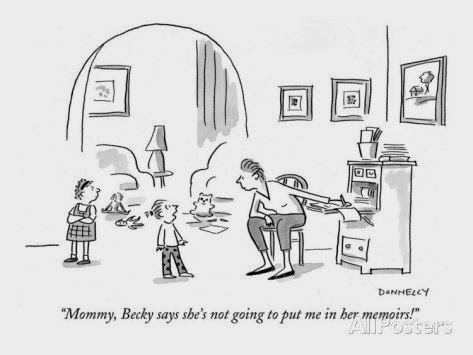
That's what good writers do. They observe, they listen, they feel, and they incorporate those sensations in their stories.As Stephen King says: “Description begins in the writer’s imagination, but should finish in the reader’s.” Ultimately, your work must withstand the judgment of the reading public. That can be a harsh, frightening and disquieting experience for some. "A person who publishes a book willfully appears before the populace with his pants down," Edna St. Vincent Millay once wrote.The fact is, some people will like what you write; others will not. I am reminded of the English professor who once wrote to a student: "I am returning this otherwise good typing paper to you because someone has printed gibberish all over it and put your name at the top." Of course, as Sinclair Lewis said: "It is impossible to discourage the real writers — they don't give a damn what you say, they're going to write."That may be the most appropriate attitude for any writer to cultivate.
 In both cases the creation lacks focus and doesn't tell a story.The writer and the artist both need to understand and use the fundamentals of their disciplines in order to create something that stirs our emotions and satisfies us in some personal way.People who write memoirs without understanding the most basic tenets of the writer's craft are like the untrained and nascent artist who wants to paint like Monet or Degas without basic conceptual knowledge of composition, accent, and perspective; or how to properly employ the color wheel, the palette, and brushes.There are really only a couple of ways to learn those fundamentals. (1) Take some classes where your work receives evaluation and assessment from a credible, experienced professional; or (2) spend several months reading books and articles on writing and then practice, practice, practice by writing, writing, writing.As Ernest Hemingway once said: “It's none of their business that you have to learn how to write. Let them think you were born that way.” The first thing you will learn when you sit down in front of your computer (or before that blank sheet of paper, if you decide to compose in long hand) is that writing is an intensely solitary activity. My advice is to seek support from other writers as you work on your memoir. Few people can appreciate the struggles a writer faces like another writer can.I already mentioned that you should consider taking a writing course at a university, community college, or community center. Classes like these provide structure and often require you to produce a set number of pages on deadline. This kind of rigid structure is very helpful for some writers. It teaches writing discipline. The critical thing is this: the grades you receive (if grades are given) are less important than the skills you must master and the feedback you will receive. You might also join a book club. Seek out a club that specializes in memoirs and biographies, etc. Listen to what other readers admire in the books you are reading as well as what they don’t like. This information can prove invaluable to you when writing your own memoir.Join an online writers group. They are easy to find and most cost nothing to join. Some are more serious than others, but in most cases members are eager to share information about such things as the writing process, research, submitting a manuscript for publication, sending work to literary agents, etc. Make a point of attending book festivals and local readings at libraries and book stores. You should join in the world of books and writing at the grassroots level. Talk to other authors and listen to their experiences, not only in writing but in marketing their books. You will develop new friendships, learn new lessons, and come to see and appreciate books in a new light. Now, let's look a few fundamentals of memoir writing.
In both cases the creation lacks focus and doesn't tell a story.The writer and the artist both need to understand and use the fundamentals of their disciplines in order to create something that stirs our emotions and satisfies us in some personal way.People who write memoirs without understanding the most basic tenets of the writer's craft are like the untrained and nascent artist who wants to paint like Monet or Degas without basic conceptual knowledge of composition, accent, and perspective; or how to properly employ the color wheel, the palette, and brushes.There are really only a couple of ways to learn those fundamentals. (1) Take some classes where your work receives evaluation and assessment from a credible, experienced professional; or (2) spend several months reading books and articles on writing and then practice, practice, practice by writing, writing, writing.As Ernest Hemingway once said: “It's none of their business that you have to learn how to write. Let them think you were born that way.” The first thing you will learn when you sit down in front of your computer (or before that blank sheet of paper, if you decide to compose in long hand) is that writing is an intensely solitary activity. My advice is to seek support from other writers as you work on your memoir. Few people can appreciate the struggles a writer faces like another writer can.I already mentioned that you should consider taking a writing course at a university, community college, or community center. Classes like these provide structure and often require you to produce a set number of pages on deadline. This kind of rigid structure is very helpful for some writers. It teaches writing discipline. The critical thing is this: the grades you receive (if grades are given) are less important than the skills you must master and the feedback you will receive. You might also join a book club. Seek out a club that specializes in memoirs and biographies, etc. Listen to what other readers admire in the books you are reading as well as what they don’t like. This information can prove invaluable to you when writing your own memoir.Join an online writers group. They are easy to find and most cost nothing to join. Some are more serious than others, but in most cases members are eager to share information about such things as the writing process, research, submitting a manuscript for publication, sending work to literary agents, etc. Make a point of attending book festivals and local readings at libraries and book stores. You should join in the world of books and writing at the grassroots level. Talk to other authors and listen to their experiences, not only in writing but in marketing their books. You will develop new friendships, learn new lessons, and come to see and appreciate books in a new light. Now, let's look a few fundamentals of memoir writing.
 Perhaps the first thing you need to ask yourself is: Why are you writing a memoir? Is it to leave a legacy for your family or for others? Is it to share what you have learned in your life; your wisdom? How will others feel after reading your memoir? Will they be happy or touched? Will what you write make a difference in their lives? And how will you feel after you finish your memoir? Will you be fulfilled, pleased or will you feel there are still some things left unsaid?Don't be too hard on yourself. But at the same time, be truthful. Writing a memoir is as much about telling the truth about your life, as it is recording important events. You are not going to remember some things you wish you could and you will remember some things you wish you could forget. That's life! It is filled with success and anguish. It is those experiences--both good and bad-- that make a good memoir.Memory is volatile. You may remember peculiar details, such as the smell of one of your grandmother's favorite dishes, but forget your grandmother's first name. Not to worry. The answers may come in dreams, chance conversations, photos or letters. There will be times when you won't know what to write. Don't let that stop you. Write down anything that is in your head. You may feel what you are writing sounds stupid. That's OK, write it down anyway. It doesn't matter. The key is to keep writing...typing the words in your computer or keeping the pen moving over the paper. Eventually, the words will begin start to flow. Isaac Asimov may have said it best: "Writing, to me, is simply thinking through my fingers."Think about writing a little each day. Don't worry if the task seems daunting or that you don't seem to be producing very much. Think about it. It took you years to live your life and deal with the experiences you have had. You can't write it all down in a few short days or weeks. Take it one day at a time. In a few weeks or months you will have produced dozens of pages.
Perhaps the first thing you need to ask yourself is: Why are you writing a memoir? Is it to leave a legacy for your family or for others? Is it to share what you have learned in your life; your wisdom? How will others feel after reading your memoir? Will they be happy or touched? Will what you write make a difference in their lives? And how will you feel after you finish your memoir? Will you be fulfilled, pleased or will you feel there are still some things left unsaid?Don't be too hard on yourself. But at the same time, be truthful. Writing a memoir is as much about telling the truth about your life, as it is recording important events. You are not going to remember some things you wish you could and you will remember some things you wish you could forget. That's life! It is filled with success and anguish. It is those experiences--both good and bad-- that make a good memoir.Memory is volatile. You may remember peculiar details, such as the smell of one of your grandmother's favorite dishes, but forget your grandmother's first name. Not to worry. The answers may come in dreams, chance conversations, photos or letters. There will be times when you won't know what to write. Don't let that stop you. Write down anything that is in your head. You may feel what you are writing sounds stupid. That's OK, write it down anyway. It doesn't matter. The key is to keep writing...typing the words in your computer or keeping the pen moving over the paper. Eventually, the words will begin start to flow. Isaac Asimov may have said it best: "Writing, to me, is simply thinking through my fingers."Think about writing a little each day. Don't worry if the task seems daunting or that you don't seem to be producing very much. Think about it. It took you years to live your life and deal with the experiences you have had. You can't write it all down in a few short days or weeks. Take it one day at a time. In a few weeks or months you will have produced dozens of pages.

In writing a memoir remember that emotional truth is often more important than factual truth. What do I mean by that? What years did Uncle Bill serve in the Army? What was the unforgettable neighbor's name who lived across the street? These are all significant details that you will want to know when writing your memoir. But don't worry if you can't recall them.More important is how proud you were when your Uncle Bill was awarded the Congressional Medal of Honor or how relieved you were when your car wouldn't start and that neighbor drove you and your pregnant wife to the hospital during a raging snow storm and got you there five minutes before your daughter was born. Facts fill in the story's canvas. But it's the emotive truths that hold the story's heart.Don’t tell your story sequentially. That’s too obvious. Most good books don’t start at the beginning. Instead they captivate you with instant conflict and intrigue. A good beginning provides readers with just enough deception to hook them without revealing the ending. Then it returns to the chronological beginning and fills in the backdrop.When you're writing make sure you use all five of your senses. You want your readers to inhabit vivid new worlds that you have created for them. However, too many novice writers produce first drafts that are lackluster, mind-numbing and uninspiring.Write colorfully, intensely and with texture if you want to transport readers to the world you are creating. How do you do that? By creating detail; by using all of your senses (sight, smell, touch, sound, and taste) to fully re-create a moment in time. It's easy to learn how to do this. The next time you’re waiting in a line at a restaurant, the post office or the dentist's office, become aware of the diverse sights, sounds, smells, and textures around you.

That's what good writers do. They observe, they listen, they feel, and they incorporate those sensations in their stories.As Stephen King says: “Description begins in the writer’s imagination, but should finish in the reader’s.” Ultimately, your work must withstand the judgment of the reading public. That can be a harsh, frightening and disquieting experience for some. "A person who publishes a book willfully appears before the populace with his pants down," Edna St. Vincent Millay once wrote.The fact is, some people will like what you write; others will not. I am reminded of the English professor who once wrote to a student: "I am returning this otherwise good typing paper to you because someone has printed gibberish all over it and put your name at the top." Of course, as Sinclair Lewis said: "It is impossible to discourage the real writers — they don't give a damn what you say, they're going to write."That may be the most appropriate attitude for any writer to cultivate.
Published on July 18, 2014 16:22



